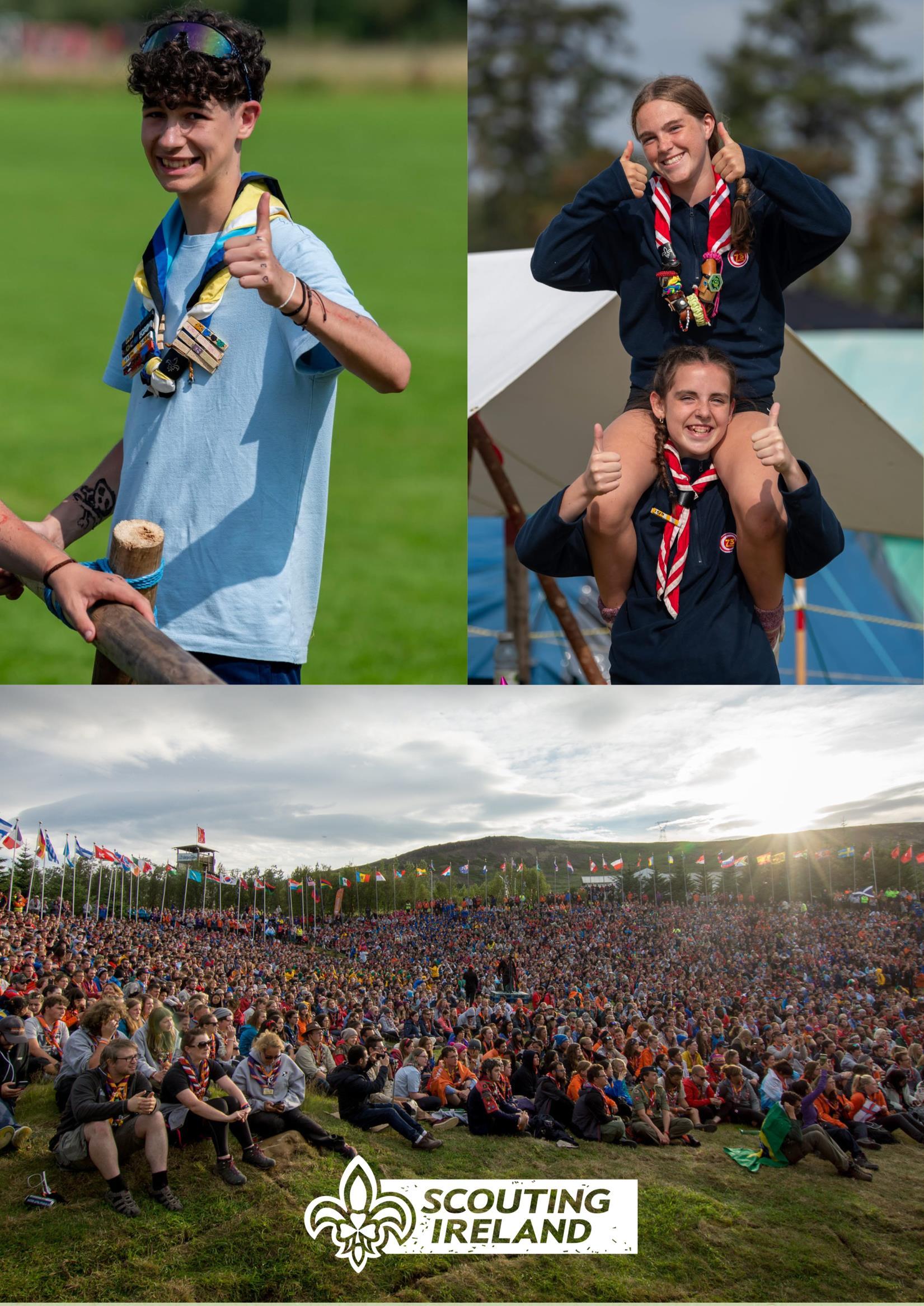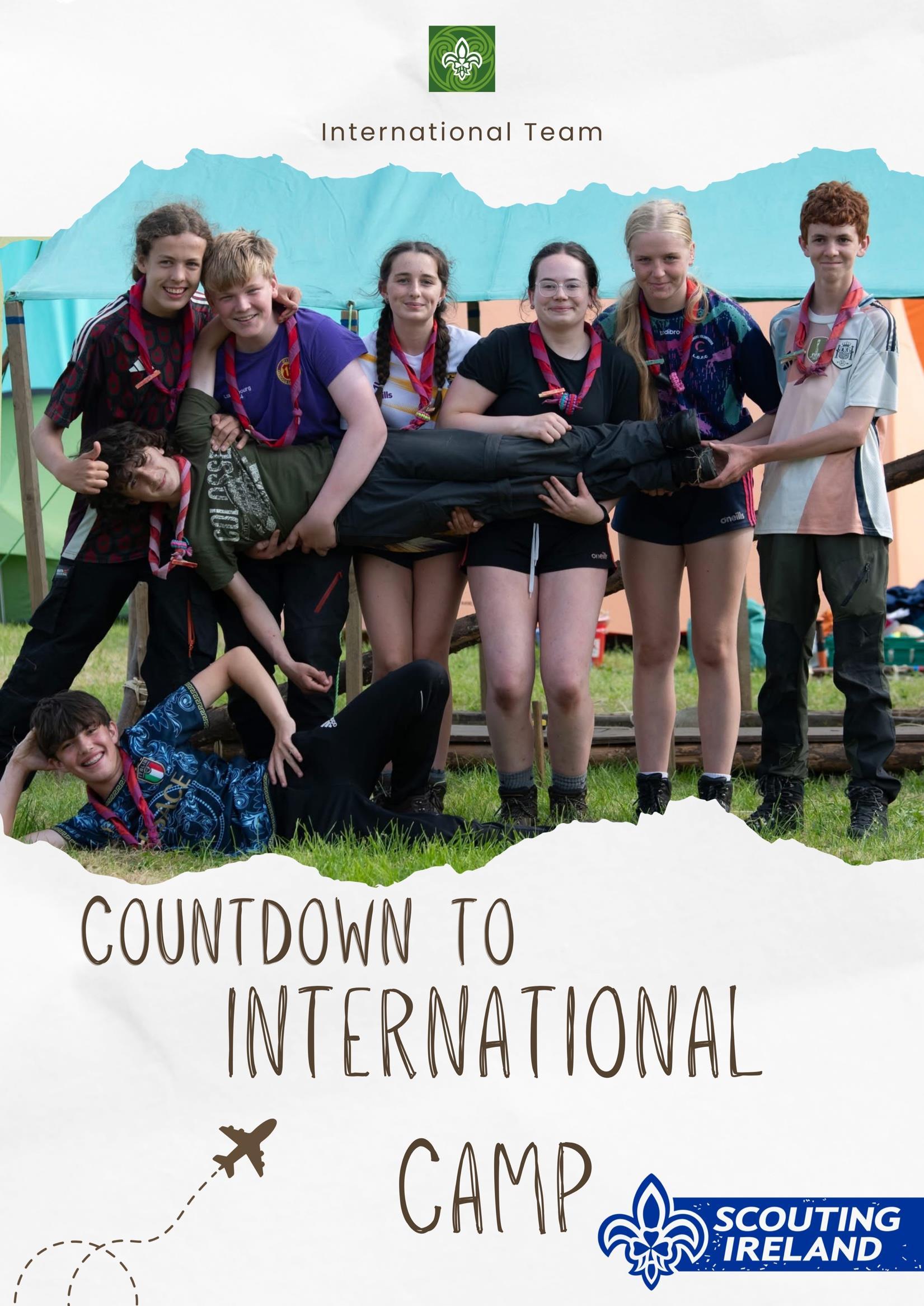
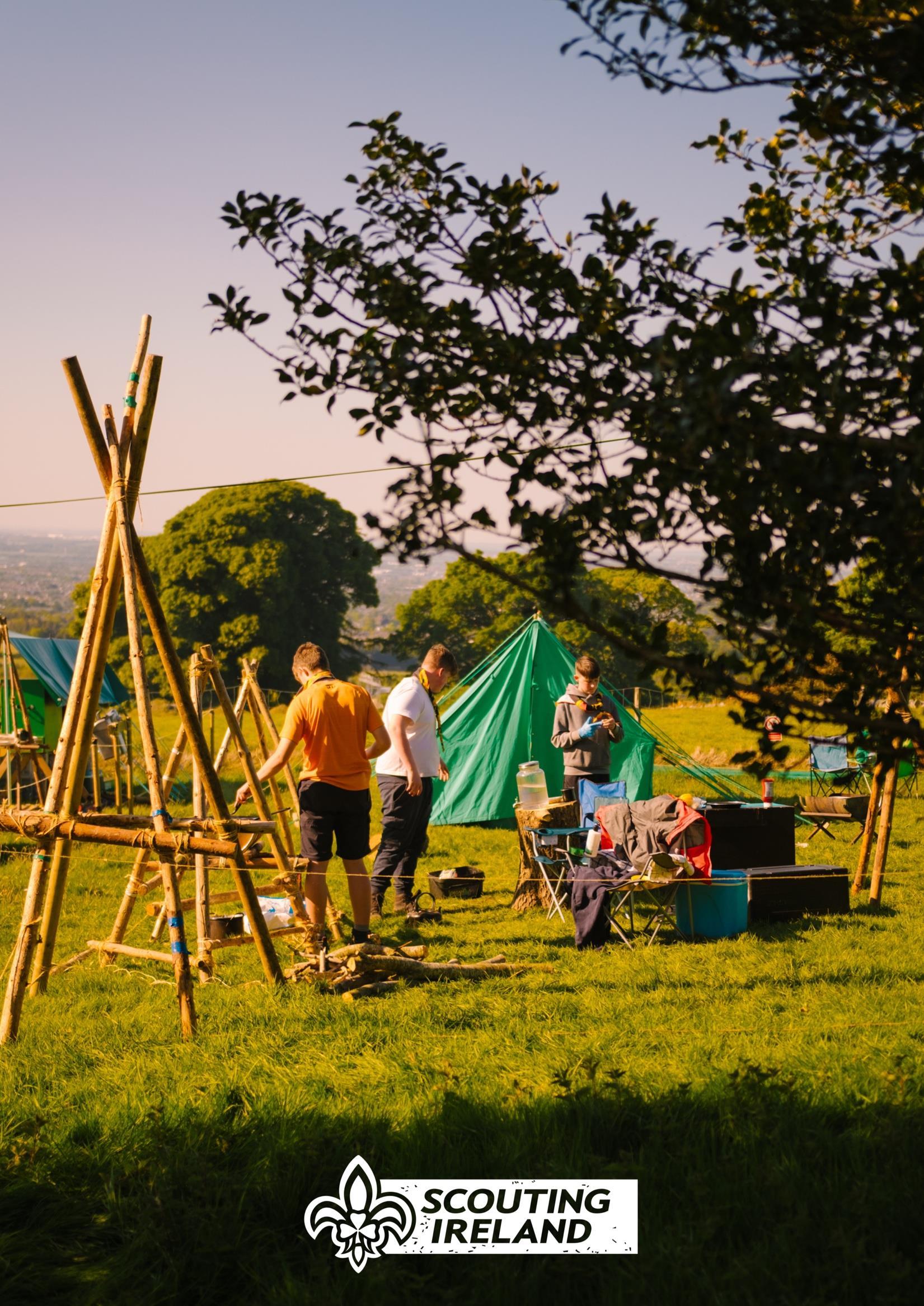
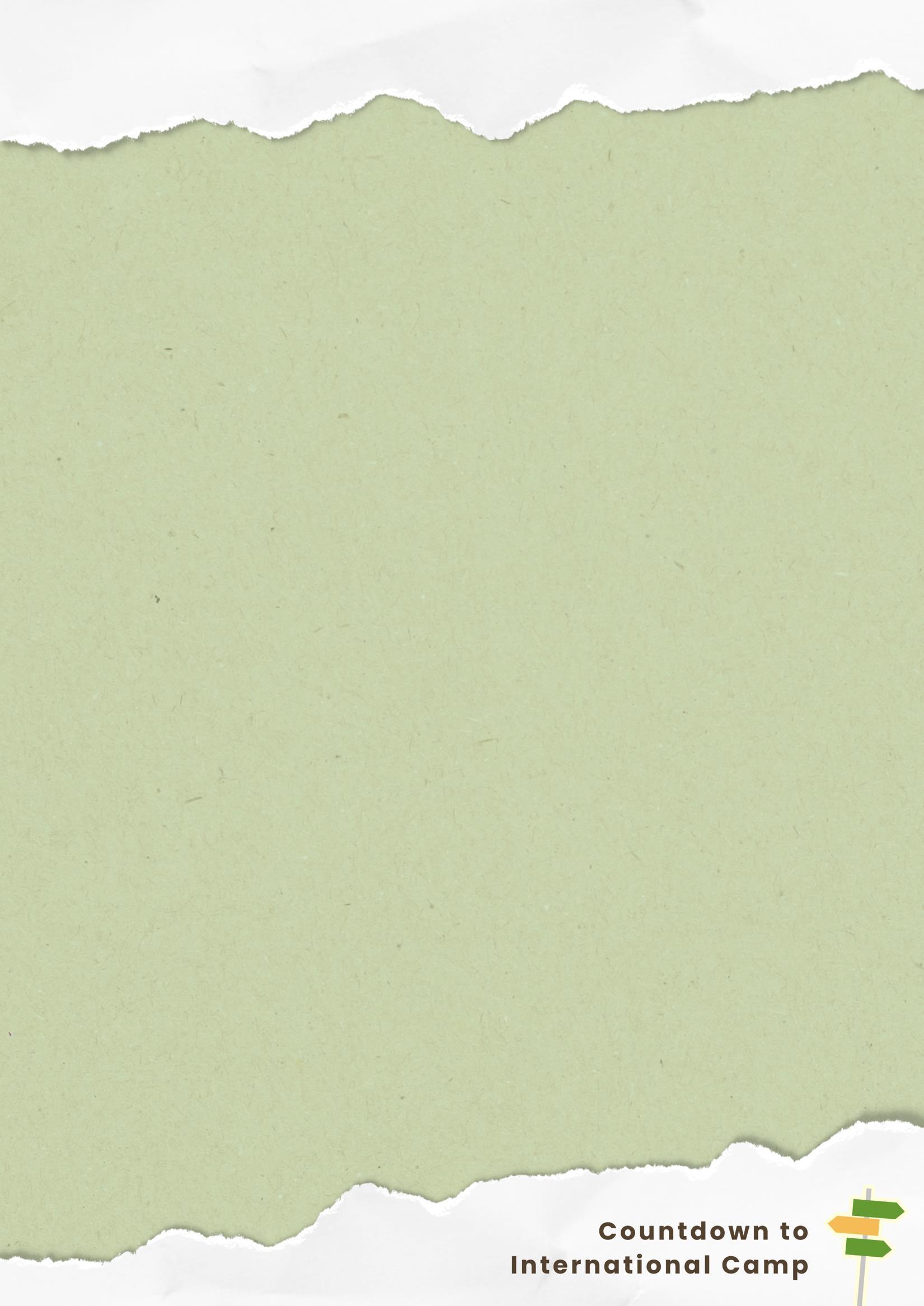





Planning an international adventure is a big undertaking, but one that should be planned to allow each Scout to have an international experience at least once in their scouting lifetime. In Scouting Ireland, any camp outside of the island of Ireland is considered to be an International Camp. By the time September arrives some of the initial decisions may already have been taken, for example, the country or event you intend to visit, whether it will be a camp or a hostelling experience, or what major things you would like to do when you are there.
An important first step when preparing to plan for an international camp is to identify the right people to be involved in the planning process. This should include a mix of Scouters and youth members from the section(s) that will be attending the camp. Many groups find it helpful to involve the Patrol/Watch Leaders Council and/or members of the Venture Scout Executive (as relevant) in the planning team. Rover Crews should be able to plan their own camp, with regular updates shared with their Rover Advisor.
Once the right people have been identified, the next step is to have a meeting of the Planning Team (Scouters and Youth Members) to brainstorm and look at a variety of ideas and destinations. Once everybody throws in some ideas, each one should be discussed to see which people are most interested in. Those on the Planning Team should consider their own views as well as those of the members from their pack/troop/unit/crew.
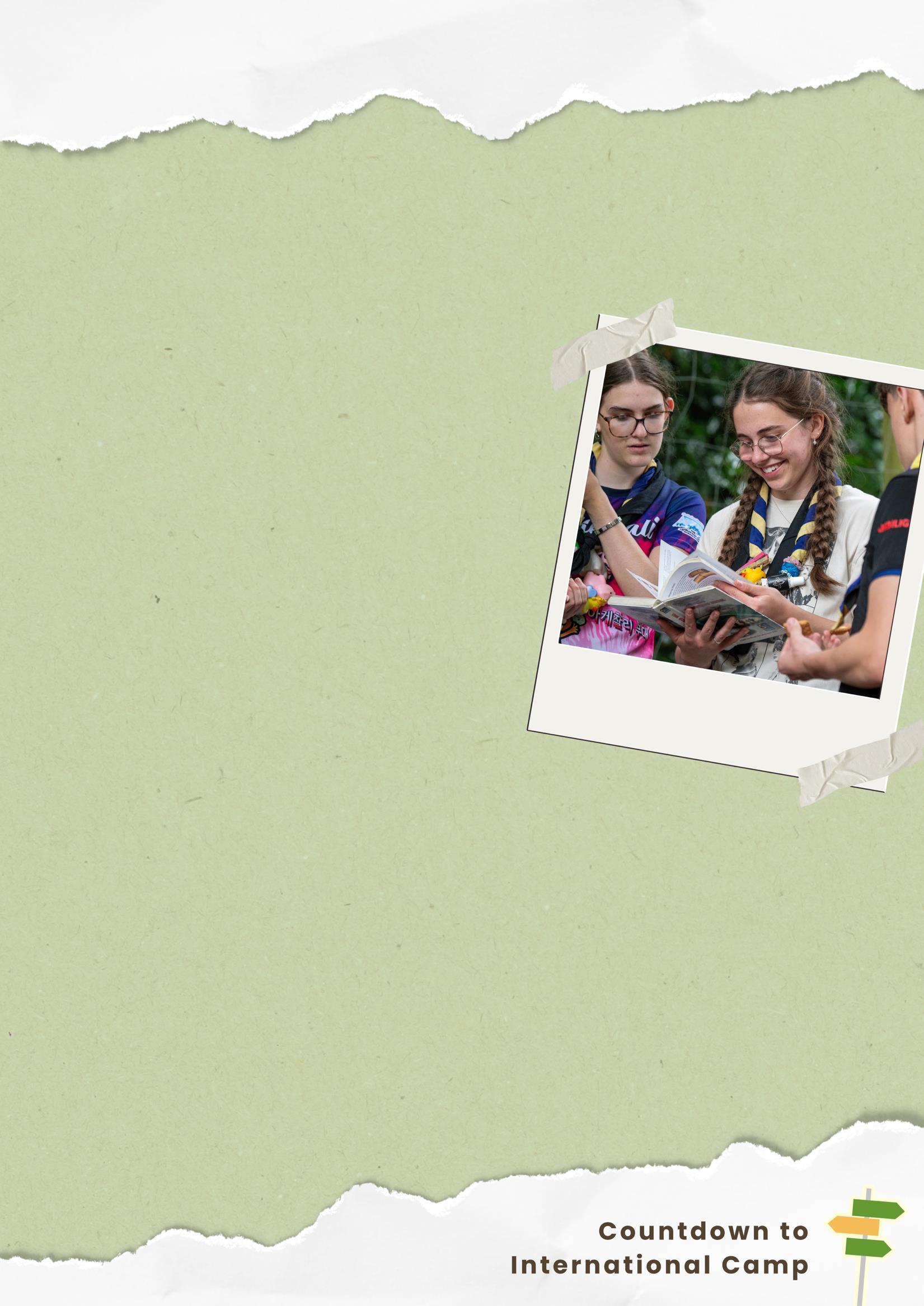
When a shortlist of options has been agreed, they should be delegated to Planning Team Members for further investigation. The Planning Team should also consult with the Group Leader to see if they have any ideas to add to the plan.
Scouters should be prepared to offer advice when asked and to help to risk assess the final decision. This risk assessment should be conducted in consultation with the Planning Team, so that everyone, especially the Youth Members involved, understands and learns from the process.
It is important that when the planning team are discussing the summer camp around a table that they do a bit of brainstorming on all the possible options.
With all programmes discussed, keep in mind the Scout Method and the way that the programme will be implemented, e.g. water activities, progress scheme, adventure skills etc...

As the new scouting year starts, planning for an international experience will really kick off, there are a few initial things you should do. If you think you might need some support in the process, you can notify your Provincial Support Officer (PSO) and your Provincial International Coordinator that you are beginning to plan and might need some help. Your Group Leader might have the right contact details already, but if not, you can email international@scouts.ie and your notification will be forwarded to the relevant people who can help. There is a large network of Scout people throughout the world who would be happy to help you plan your adventure. The International Coordinator may also be able to help with identifying places and venues that others have visited and even advise on some to be avoided.
Very soon into the process you should inform parents and guardians of your plans to travel abroad for summer camp. This will ensure they have notice for making other summer plans and can begin saving. It will also help those planning to get an indication whether there may be any issues for any youth members travelling out of the country. For now, just a brief notice is sufficient. A more detailed letter and parents’ information meeting can be organised when more details of the camp are confirmed.
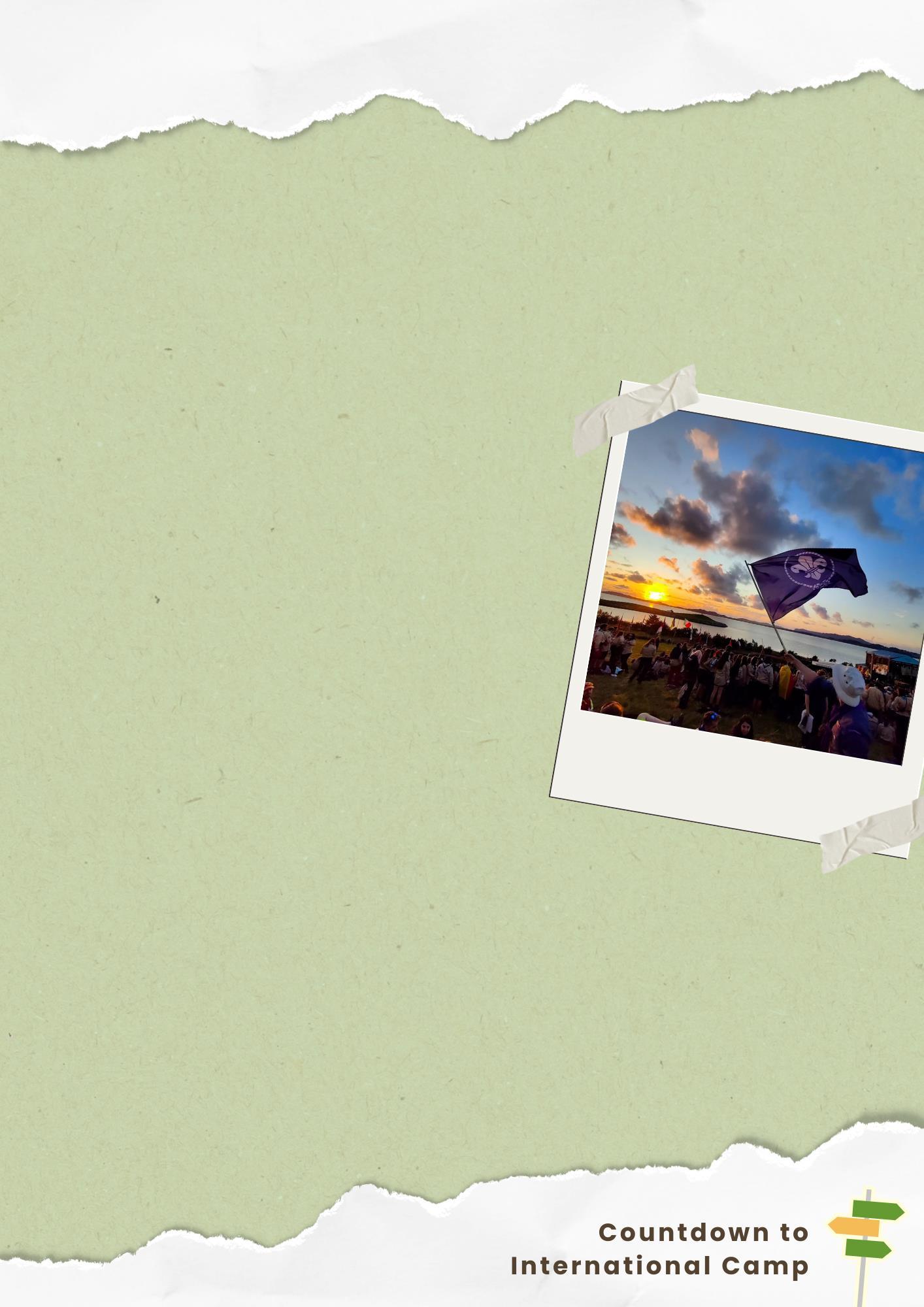
Each Youth Member and Scouter intending to attend the international camp will need a valid passport to travel outside of Ireland.
Although Irish citizens travelling to the United Kingdom do not require a passport due to the Common Travel Area, a passport is the most accessible form of photo identification required for Youth Members and some airlines or carriers may only accept passports, so it is safer to ensure that everyone has a valid passport. September is a good time to ask parents/guardians and Scouts to check their passports to see if they will be in-date for the intended travel period.
Some countries require a passport be valid for a certain period after the planned date of returning to Ireland. Generally, a safe rule-ofthumb is to have at least six months left in a passport’s validity when travelling, but details for individual countries can be found on the Department of Foreign Affairs’ website:
https://www.ireland.ie/en/dfa/overseastravel/advice/
Members who do not yet hold a passport or who hold one that will expire before or during the international camp will need to apply for a passport. This is best done online on the DFA’s website: https://passportonline.dfa.ie/Apply/Passport

Restrictions on people travelling to certain countries mean members of your Scout Group may need to apply for a visa to enter the country you plan to visit. Some visas should be applied for in advance. Others are applied for at the airport upon arrival in a country. Details for visa requirements for individual countries can be found on the Department of Foreign Affairs’ website: https://www.ireland.ie/en/dfa/overseastravel/advice/.
Another important consideration is to check whether those travelling to the country or countries you intend to visit require vaccinations. Certain vaccinations are compulsory. In these cases, you will need to show an International Certificate of Vaccination to enter to the country in question. Other vaccinations are recommended, and the decision is left to individuals’ discretion. However, we recommend members of Scouting Ireland do everything possible to guard against illness and disease while on camp.
Travel Health Pro is a useful tool funded by the UK government which provides detailed guidance on required and recommended vaccinations per country: https://travelhealthpro.org.uk/countries. Those on the Planning Team may also wish to consult the Health Service Executive (HSE) or travel agent. Those travelling should also seek advice from their General Practitioner in advance of travel.
Start the process of vaccinations well before you plan to travel. Some vaccinations take time to become effective, for example, the BCG vaccination against tuberculosis (TB) should be administered at least 3 months before travel.
Remember to add the cost of vaccinations and visas into your budget planning.


At October’s planning meeting, it is time to start looking at the different possible activities for your international camp. If you are staying in a Scout centre, there may be programme options available to support your planning. If you are attending an international event, the programme will mostly be managed by the event organisers. The Planning Team should review the programme planning report, including possible activities, risk assessments and costs, etc. Scouting Ireland is currently developing templates to help with completing risk assessments. They will be published online in late 2025.
After the programme planning report is reviewed, it is time for discussion! Questions and concerns should be answered or addressed and any possible challenges that are identified should be teased out. All issues like feasibility, cost, programme, etc should be discussed at length. At this stage, it is important to still be open to new ideas, if they arise. Those on the Planning Team should then begin making decisions and select the dates for summer camp. This is the option that the Camp Planning Team now needs to research further.
Following this, the preferred option is then presented to the rest of the programme section(s). It is important to highlight that, at this point, there is still a possibility of change, depending on the feedback received.

Once the overview of the camp is agreed, it is time to assign roles to some members of the Camp Planning Team. Additional roles may be needed for some camps. Each role should be shared between a Scouter and one or more Youth Members. This will allow for sharing of knowledge and experience within the group.
• Scouter in Charge (Camp Chief): They will oversee all aspects of the camp and make sure that all other team members are completing their tasks. It is not up to the Camp Chief to run the camp, but it is their responsibility to let everyone know what is happening and what they should be doing.
• Quartermaster/Bosun: They will draw up a sectional gear list for the camp (keeping in mind activities, etc.) and will make sure that all necessary equipment and gear is brought on camp. This may involve organising equipment be rented on site, transported at time of travel, or shipping out in advance. Additional responsibilities include ensuring that the equipment and food needed for each day is available and that everything is being kept in good condition.
• Treasurer/Purser: They will ensure that the budget is kept to while planning the camp and on the camp. This treasurer would also run the Camp Bank on camp (if required).
• Programme Co-ordinators: This role will involve the overseeing of the programme/ equipment and to ensure that the programme is taking place and everyone is participating.
• Logistics: They will co-ordinate all travel arrangements and work with the Quartermaster/Bosun in planning the movement of gear and equipment.
• First Aider: They will have appropriate first aid training/qualifications and ensure that the first aid kit supplies required are available for camp (either brought from Ireland or sourced abroad).
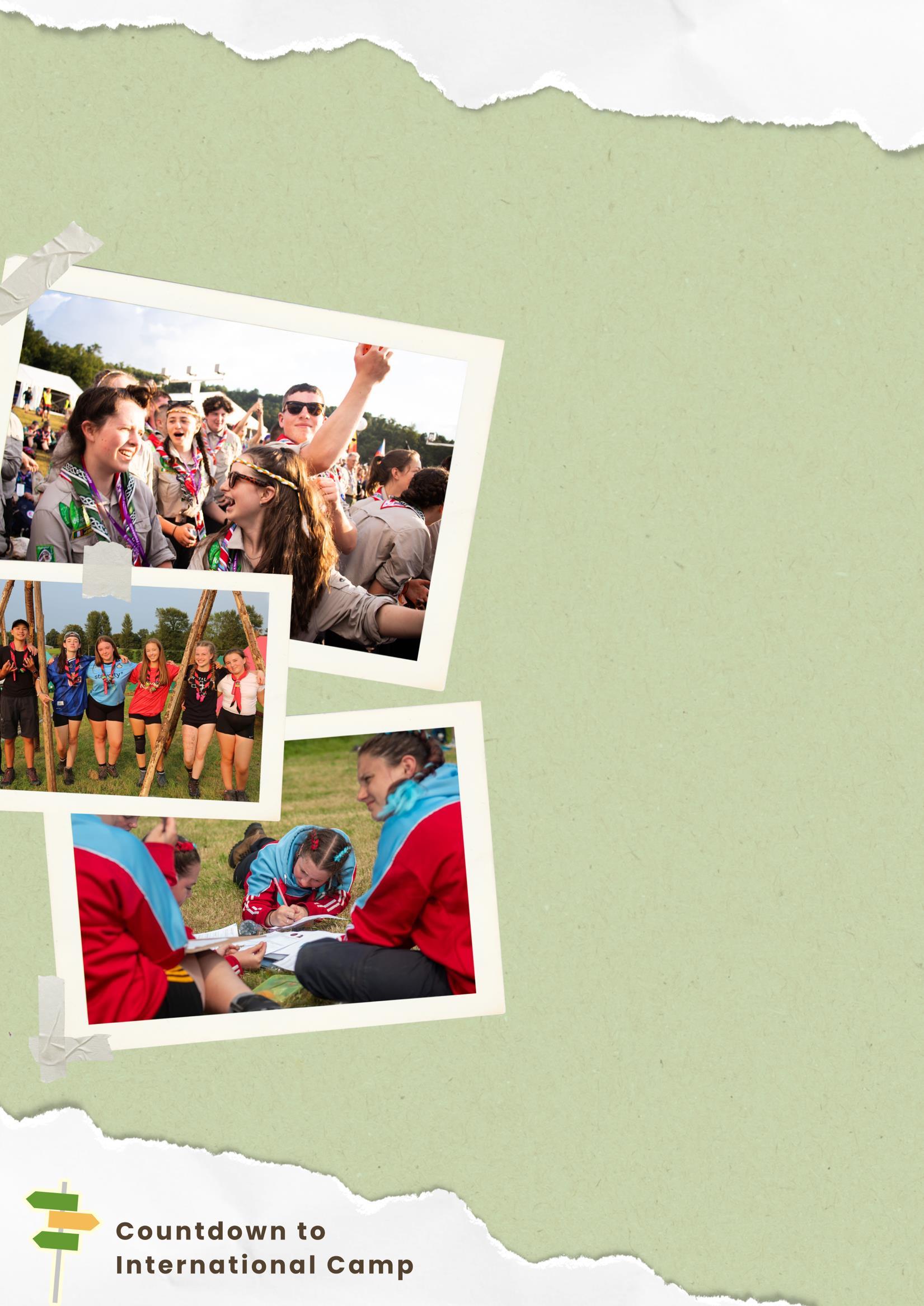
As of September 2025, the current training requirements for Scouters attending international camp are:
• Every Scouter attending: Being a Scouter.
• Camp Leader: Overnights Adventures and International Camp (or Woodbadge Stage 5 and over), Being A Scouter.
• First Aider: (Same as Camp Leader on the application) REC 3, Being a Scouter.
The current training requirements for Rovers attending international camp are:
• Rovers: ‘On My Honour’
• Rover + Scouter: ‘Being a Scouter’ training to attend in a Scouter capacity.
Please note: Individuals registered as Rover only cannot be used to make up Adult to Youth Ratios.
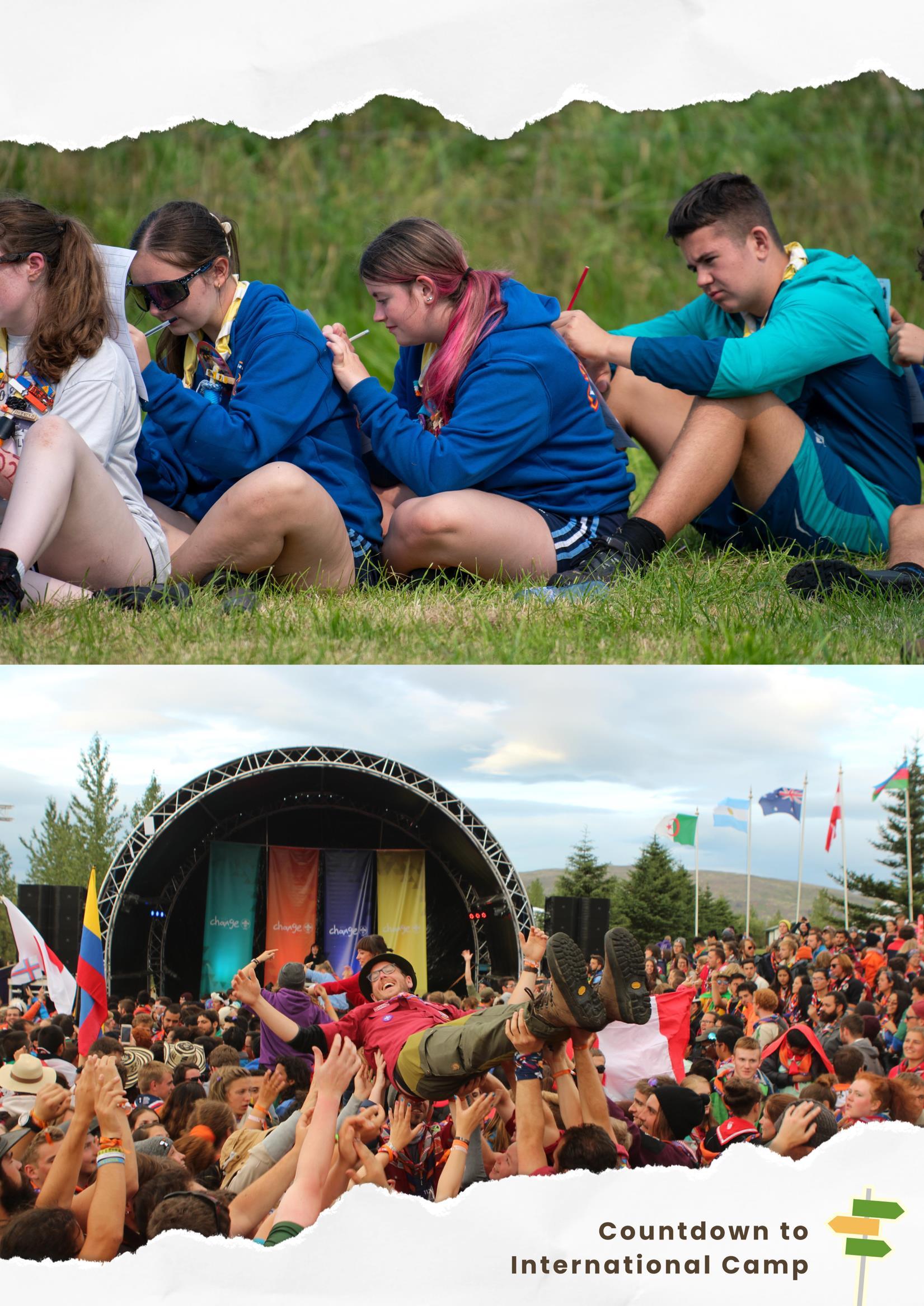

When budgeting for an international camp, all eventualities should be considered. If in doubt, be conservative in your budgeting to help ensure that the section or group isn’t short money at the end of the camp. It is always easier to refund some funds after a camp than seek more once you return home.
The budget is best presented and managed when it’s broken down into categories. Each category should be assigned to a Planning Team member to get initial costings or ideas to be brought back to the team for decision.
The main categories of the budget should be:
• Travel: This will be one of the most expensive parts of the international camp, so it is always good to ‘shop around’ and explore if there is a cheaper way to get to your destination. Staff in the campsite or centre you plan to stay in may be able to offer some local knowledge to help you identify budget-friendly travel and transfer options.
• Flights:
• Remember when looking at prices of flights; include any baggage charges and payment administration fees which might not appear when you are first looking at the pricing.
• When making flight bookings for larger groups, it is advised to contact the airline company directly before booking flights online. It may also be helpful to get a quote from a travel agent, who may be able to access better deals for groups than an individual Scouter booking online.
• Flight prices usually increase closer to the time of travel, so the earlier you can book flights, the better.
• Public Transport: Some countries offer discounts for group bookings on public transport or have discounted travel passes for students of certain ages. These are often not publicised on the standard ticket booking platform, so be sure to do your research before booking.
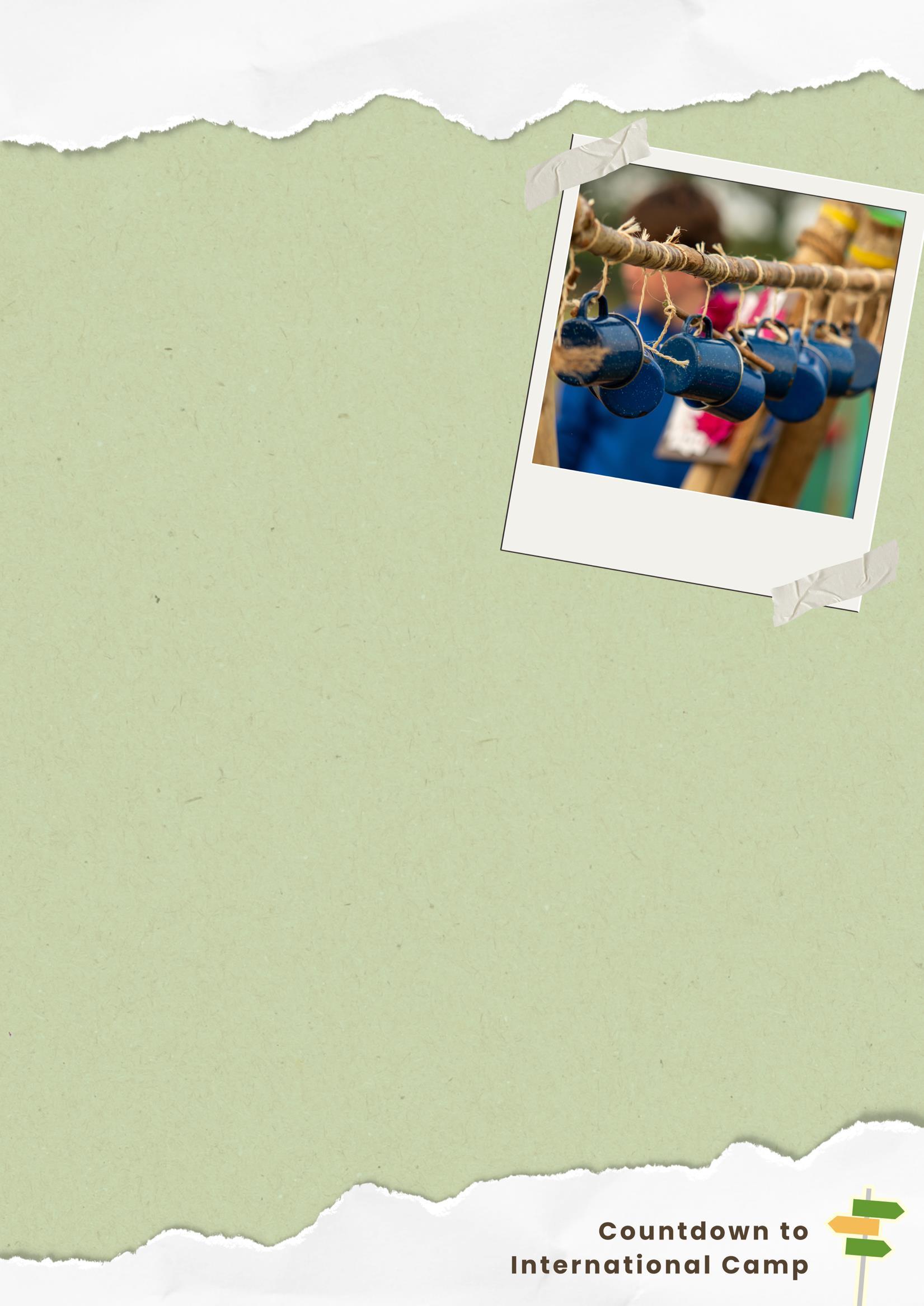
• Food: A guideline cost for the food budget would be approx. €10 per person, per day. This amount may vary depending on the length of your camp and depending on local prices of food. Remember that some foods may not be freely available in certain countries or cultures so plan ahead, particularly if some of those travelling have dietary requirements. Countries vary vastly on food prices, so a little research goes a long way.
• Equipment Transport: Groups may need to explore transport for gear to the location of the camp or try to liaise with local groups in the area from whom you could borrow gear. In addition, there may be shipping, van hire for gear, and insurance costs that need to be considered. Also include petrol/diesel costs for transporting gear or equipment in the budget.
• Insurance: Additional travel insurance is required for all Scouting Ireland groups travelling abroad and proof of cover must be submitted to Scouting Ireland prior to travel. Travel insurance can be obtained through the Scouting Ireland insurer (Marsh Ireland) by contacting insurance@scouts.ie or through an alternative travel insurance provider.
• Accommodation: Again, always ask for a group rate/discount when booking accommodation. When enquiring, clarify what is included in the cost. Do not assume that everything you will need is included in the price. Also confirm if the price is per person or otherwise. Make sure to confirm total price in writing (email or invoice) before paying a deposit.

• Activities: When booking activities, always ask for a group rate/discount and keep in mind that some places would allow for Scouters to go free on activities. A guideline cost for the activities for a basic camp would be around €15 per day.
• Currency: When travelling outside of the Euro Zone, you will need to allow for currency exchange. If you are quoted in the currency (e.g. Swiss Francs), the cost may have changed when it comes time to pay for something, due to fluctuations in the exchange rate.
• Other: This may include: prizes for best patrol, first aid kits, extra equipment needed for the camp, miscellaneous. Generally, this ‘other’ column accounts for approximately 5% of the overall cost.
• Contingency Fund: Approximately 10% of the overall camp fee should be separate contingency money to be used for ‘What if’ scenarios. This will ensure that if the budget is tight, there will be some money available in case of emergency. For example, if there is a bad storm and it is not safe to camp, you would have funds on hand to cover the cost of a night in a hostel.
Once the total cost of the camp has been calculated a deposit (about 20% of the total cost) should be asked for in a letter to parents/guardians. An example is shown on the next page. For international camps, the deposit should be the price of the flights/transport because these are nonrefundable. Note: All payments relating to the camp should be logged. Always get a written receipt for monies paid and issue receipts to all who pay in money.
Previously, some groups used to open a bank account specifically for summer camp. This is no longer considered best practice. The Camp Chief(s) should have a discussion with the Group Leader as to how the finances for the international camp will be managed through the Group’s account. This should be agreed prior to any money being collected or spent.

Call an information meeting and invite any interested Scouts/ Ventures and their parents/ guardians to attend. The Planning Team should prepare a little presentation on the options or decision and make sure to highlight the benefits of an international experience those present. Prepare a handout outlining the location, dates and breakdown of the cost of the camp. Allow youth members and their parents/guardians to ask questions or raise any concerns that they have.
At the time of the Information Meeting, deadlines should be set for deposits. The deposit should be about 20% of the overall fee but must cover any non-refundable deposits the Planning Team needs to pay or have committed to (e.g. travel costs) for camp. The deadline for deposits will give a good indication of how many people plan to attend the camp. There should be a little flexibility in this, but not much, as you need to know numbers when booking transport, activities, etc. for the camp.

As the year progresses, the Planning Team should continue researching activities and tourist locations around the area in which the group is staying. They should have a good idea of what activities the group will be doing and on what day they will do them. It is also helpful to begin creating a log of contact details of adventure centres, bus operators, etc in the area.
Ideally the Team should look to contact a Scout group in the area they are visiting for some intercultural activities or exchanges, to learn more about Scouting in other countries. Your Provincial International Coordinator should be able to help you with these contacts.
Many people have different opinions as to what activities would suit a Scout camp. Rather than offering a list, the recommended guidance is to ensure that activities are varied enough to include all of the SPICES and are largely outdoor and adventure based, where possible.
An international camp also offers an opportunity to try activities that are not typically offered in Ireland, so try to embrace the chance to try something new or different. When planning programme, be mindful of youth member and Scouter fatigue levels. Ensure there is a balance of down / quiet time for Scouts and Scouters alike.
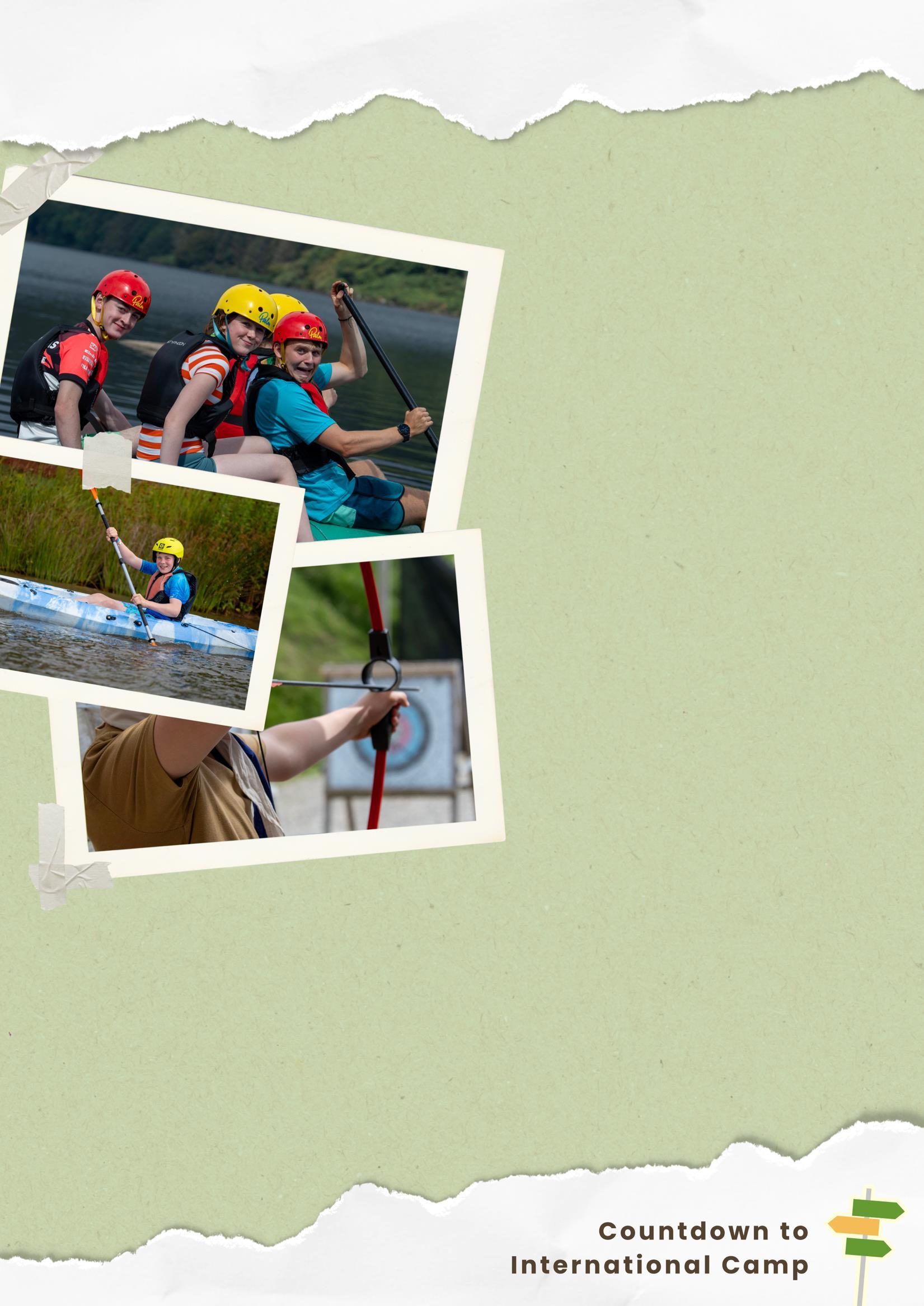
The Team should also explore what activities might be appropriate if the weather impacts on the planned programme activities. These might include a trip to a cinema, bowling alley, or museum.
An important consideration for planning programme activities is to check what activities are or are not covered by the travel insurance. If you wish to participate in an activity that is not covered by the standard travel insurance package, you can contact the insurance provider to explore if it is possible to add an activity to the policy for an additional premium.
If the camp fee is very high the Planning Team may choose to consider organising a fundraiser to reduce the price of attending camp. This could include a coffee morning, bag-packing, a table quiz or something that’s incorporated into a Scout Group’s fundraiser, for example the 12 Days of Christmas Draw. Although not a requirement, it is recommended that a service be provided within a group’s fundraising activity.
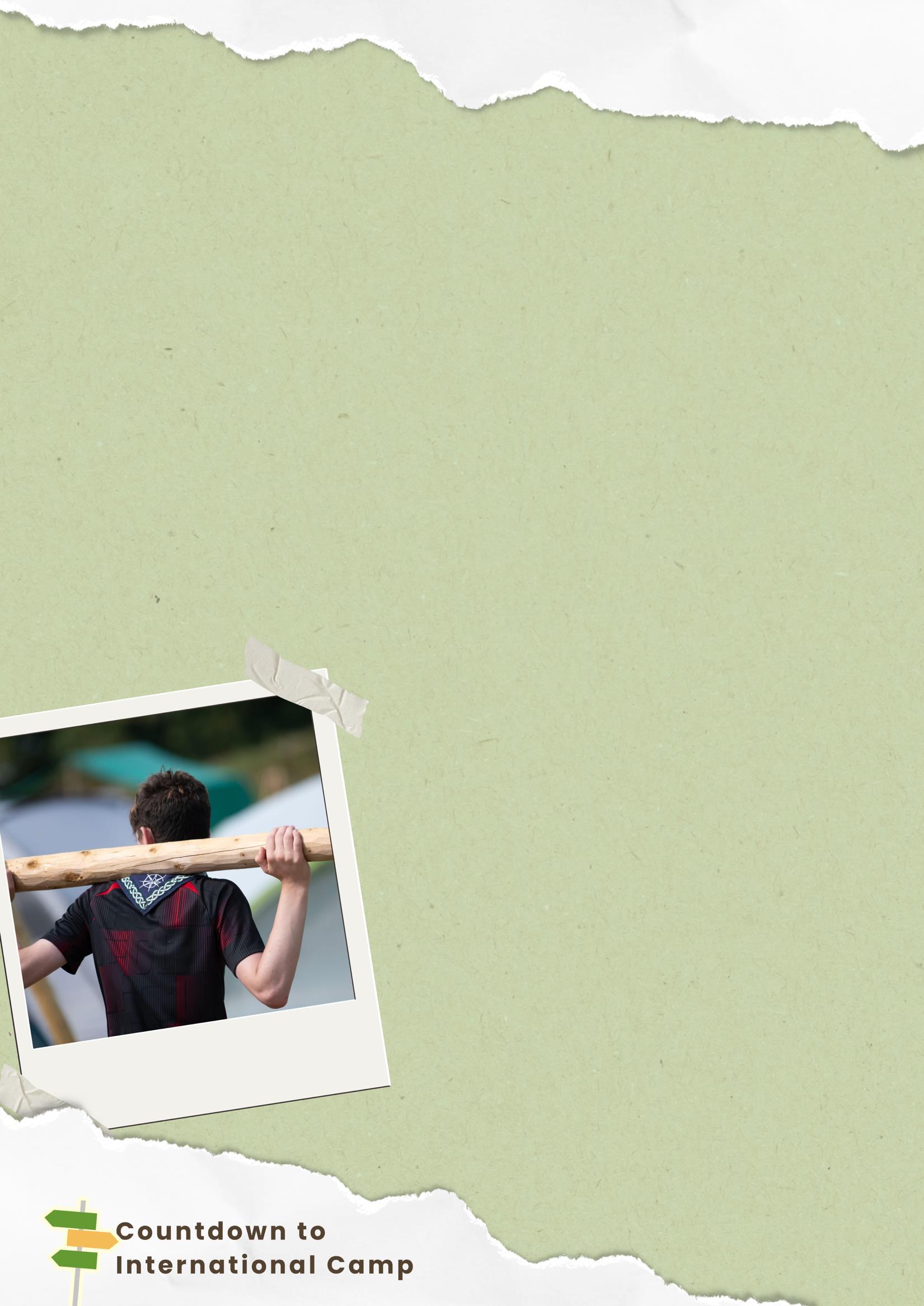
Activity Consent Forms: If not already completed, the standard Scouting Ireland ‘Activities Consent Form’ should be completed and signed by the parents of all Youth Members attending Summer Camp. If the Activities Consent Form that was filled out at the beginning of the year covers the dates of summer camp, it is not necessary for another copy of the form to be completed. If the dates on the form end in July, and the camp is in August, a new form will be required.
Parental/Guardian Permission Letter for Child Traveling Abroad: It is now a requirement with some airlines and in some countries, that if a young person is travelling without a parent/guardian, the adult travelling with the young person must be able to provide proof of parent/guardians’ authorisation for the young person to travel.
. Scouting Ireland have introduced a ‘Parental/Guardian Permission Letter for Child Traveling Abroad’ form to address this requirement. Access the form here: https://issuu.com/scoutingireland/docs/p arental_guardian_permission_letter_for_c hildren_t
Please note, groups are advised to check with their airline or ferry company to ensure that this form will be sufficient for the destination country, as well as any countries visited while in transit.
It is recommended that two copies of both forms are made in advance of camp. One set of hard copies should be brought on Camp. The second set should be left with the Home Contact.

Once the number of people attending camp is confirmed, the activities that you will be doing should be provisionally booked and will be confirmed later. The same provisional booking should be completed for any transport required during the camp. The accommodation should also be booked, if it hasn’t been done before this
At this second meeting the parents/guardians will be given an overview of the programme and some more details about the camp. It is important that parents/guardians are fully informed as to the activities that are planned, along with any risks that might be associated with them.
Additional information that might be helpful to share includes the rules of camp/camp charter (which should be signed by both parent and Scout) and the personal gear list for camp. This will ensure sufficient time for families to source items from the list that they do not yet have.
One important note to share with parents/guardians is that they must be contactable for the duration of the camp. If the parents/guardians plan on going on their own holidays abroad at the same time as camp, they must have designated a next of kin who would be able to collect and care for the youth member, should they need to return from camp early.
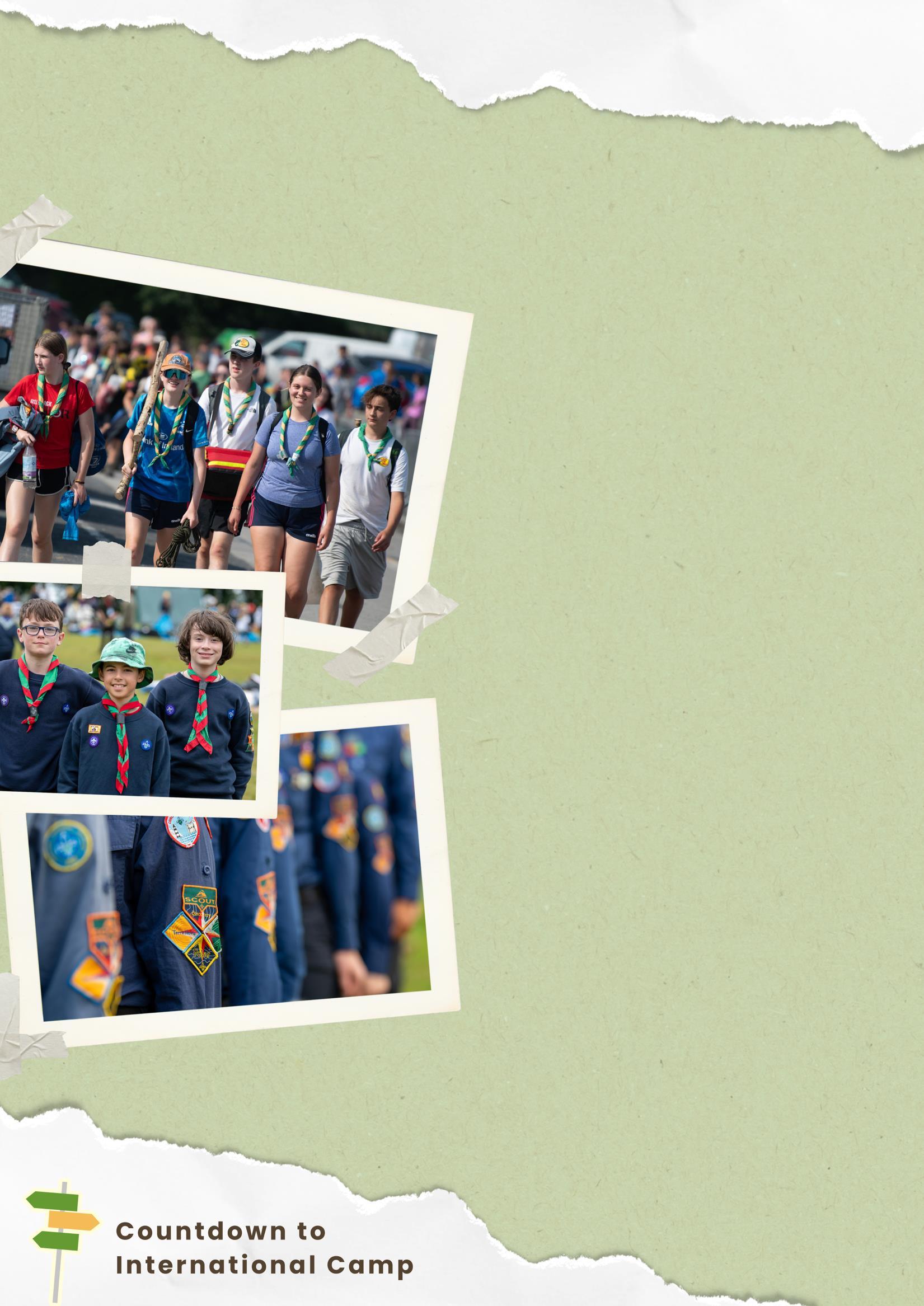
The personal gear list should be drawn up while keeping in mind the activities that the Scouts/Ventures will be doing as well as the weather, length of camp, etc.
Remember the baggage restrictions when flying or travelling as pedestrian passengers on a ferry.
Check out the luggage allowance specific to your airline or ferry company, as this can vary.
Sometimes airlines are more flexible with luggage allowances on a group booking.
It is also important to note that sometimes the low-cost airline fares are more expensive than other options once luggage is added to the booking.
When flying, also consider restrictions on what is permitted to bring in hand luggage into the plane cabin and what is permitted in checked luggage. This information will be available from your airline or airport website.
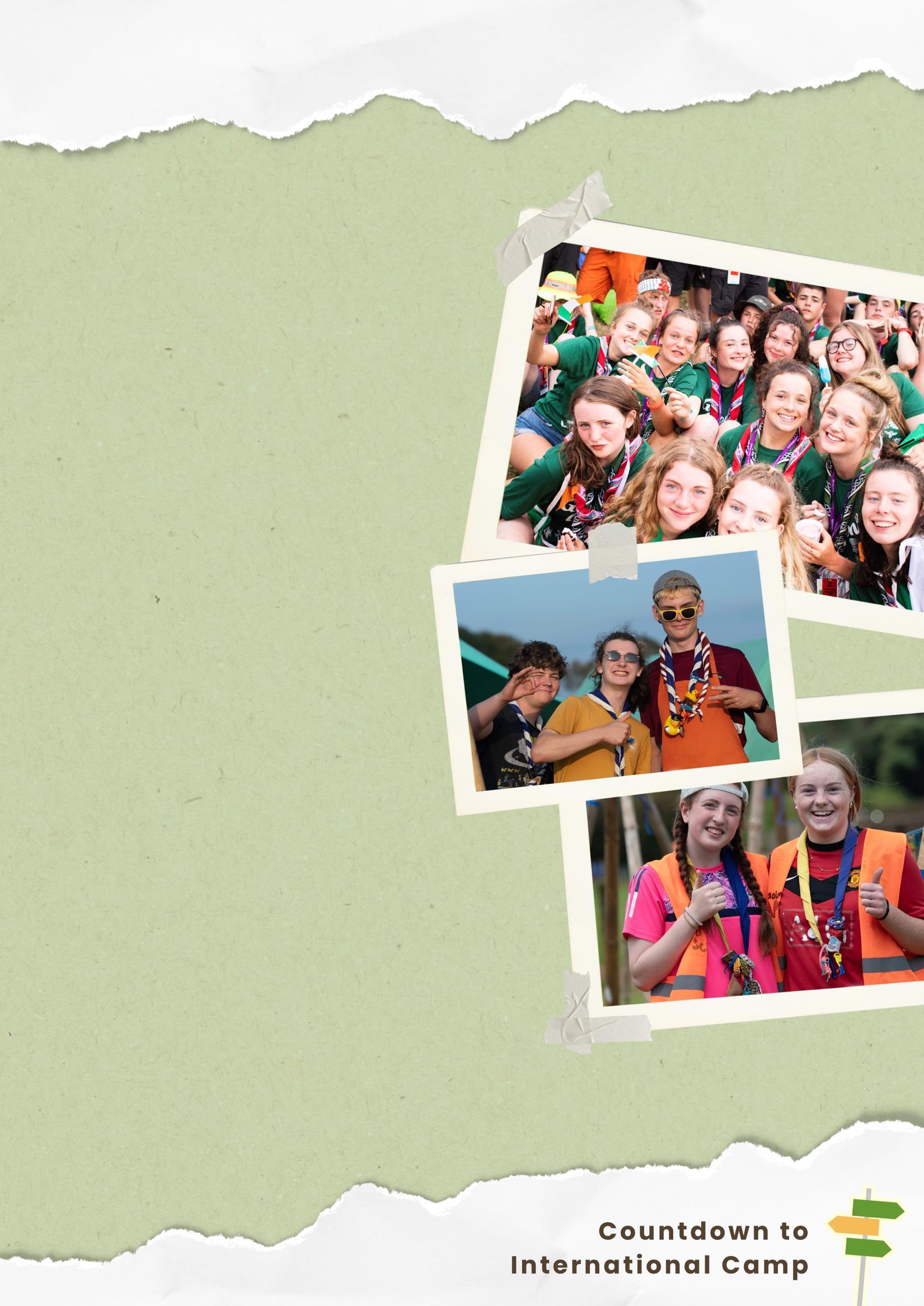
The Camp Code of Conduct should be drawn up and agreed by the youth members and the Camp Planning Team in conjunction with the Section Leader and the Group Leader. The Code of Conduct should be outlined at the parents/guardians’ meeting and then a bottom slip should be signed by both the Scout and the parent and given back to the Scouter in charge. Items that should be addressed in the Code of Conduct should include:
• Respect to Scouters and the other Scouts (The Scout Law is the Law of the Camp)
• Code around leaving the Campsite
• Sleeping arrangements
• Codes to address behaviour, etc.
• Codes on curfew, for example: After ‘lights out’, Scouts should remain in their tents and noise should be kept to a minimum’.
• Codes on respect for the environment.
• Agreement on mobile phone usage.
There should be agreed sanctions for if the Code of Conduct is broken on camp. Sanctions may range from extra jobs being assigned to being sent home from camp, depending on the seriousness of the breach of conduct.
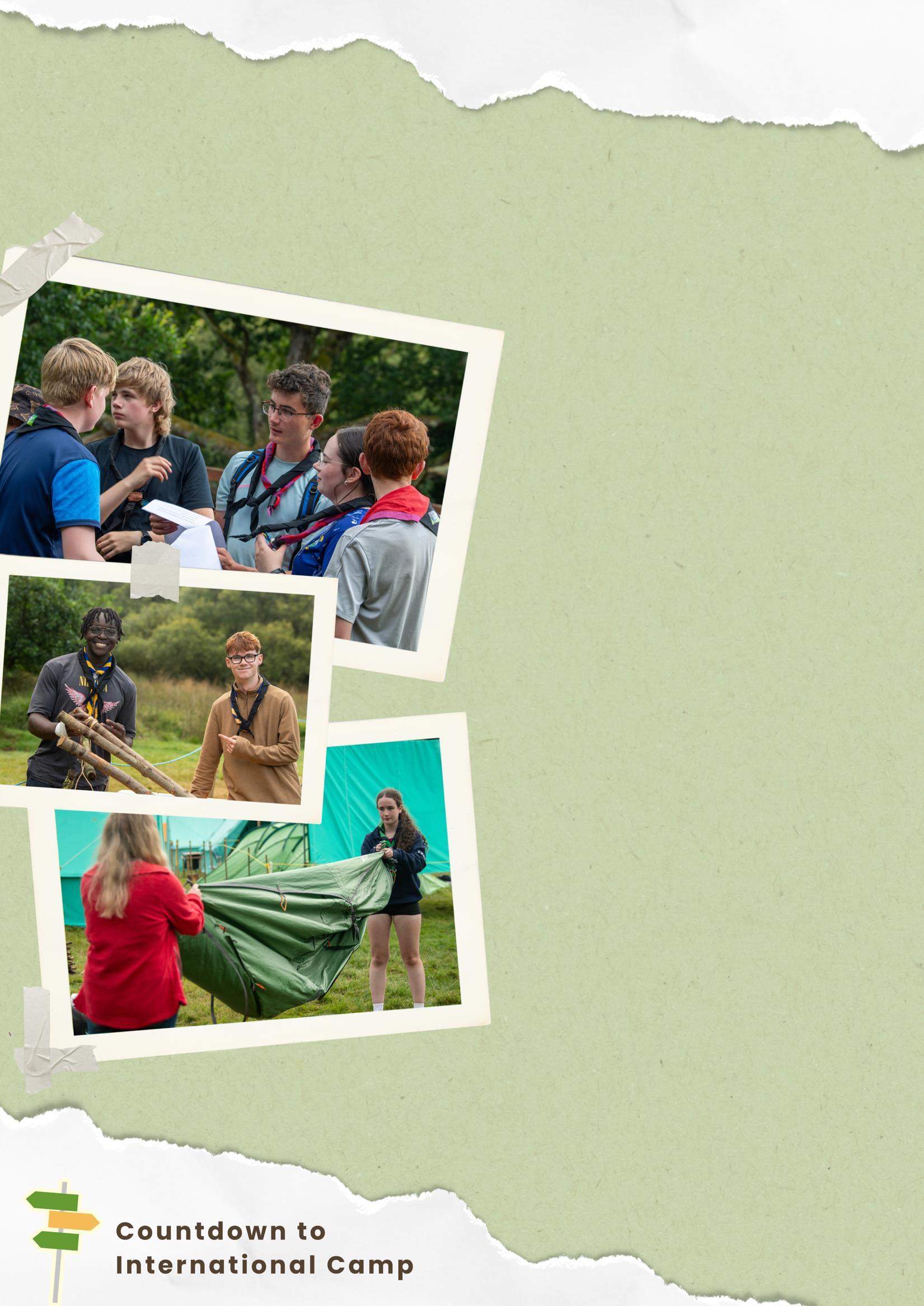
The Camp Chief or Section Leader should report to the Group Council at various stages during the preparation of Summer Camp and to get approval for same.
At this stage, the camp planning team should be able to use the feedback gathered from the discussions during the parents’ meeting to finalise the programme for camp. Once Group Council has reviewed the proposals and everyone is happy with it and the activities are planned for the camp, the team should then book all they can for the numbers that are going on camp.
Note: It is a good idea to try to get the Scouters on the activities for free as they are acting in a supervisory role while on the activity.

The European Health Insurance Card entitles the holder to free or reduced cost healthcare when travelling in Europe. You can use an EHIC in the EU, the EEA and Switzerland. Please note, this should not be considered as an alternative to travel insurance. You can apply for an EHIC if you’re living in Ireland and intend to live here for at least 1 year. You can apply:
• in person - at any local health office except Dublin North-West and Cork North & South Lee
• online - if you have a medical card or Drugs Payment Scheme card
• by post - at any local health office
For more information on applying for an EHIC, visit this website: https://www2.hse.ie/services/schemes-allowances/ehic/apply/
EHIC are valid for up to 4 years. Just like passports, if your camp is taking place in Europe, it is important to check that everyone attending camp has an in-date EHIC. More information on how to renew or replace an EHIC can be found here: https://www2.hse.ie/services/schemesallowances/ehic/renew/
For more information about how to access treatment using an EHIC, visit this website: https://www2.hse.ie/services/schemesallowances/ehic/visitors-to-ireland/
You do not need a European Health Insurance Card to get necessary healthcare while on a temporary visit to the UK, as Irish citizens have access to healthcare under the Common Travel Area. It is enough to show proof that you are ordinarily resident in Ireland – in practice, this means a driving licence, passport or similar document. However, some Scout groups choose to pack EHICs when travelling to the UK.
If you plan to bring a Scout Bus on camp or to rent a bus, van, trailer or truck abroad, ensure that Scouters have the relevant driving licences. It is advised that there are at least two Scouters with the relevant licences, to avoid Scouter fatigue and also to ensure that the activities can go ahead even if a Scouter becomes unwell on camp.
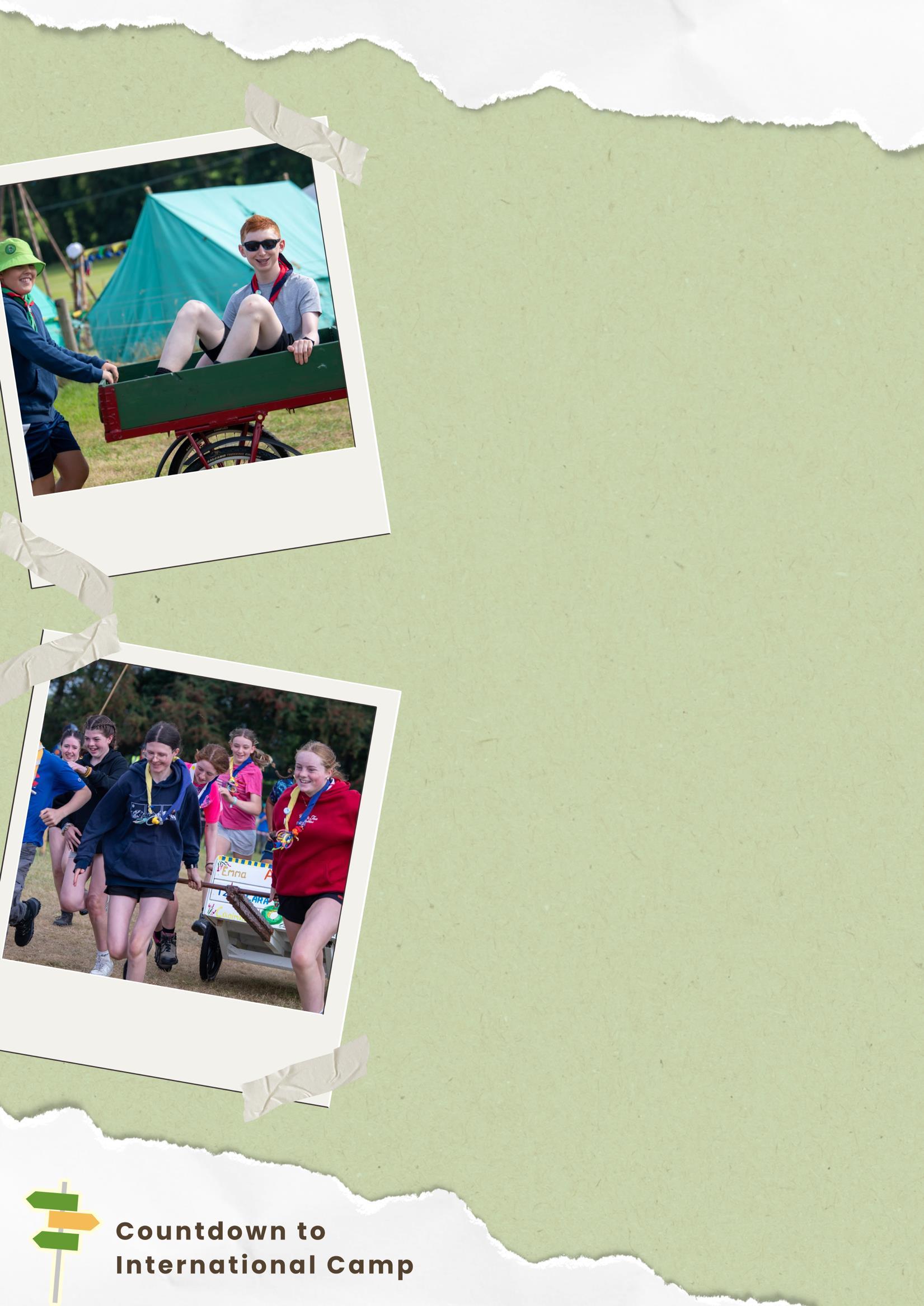
Another important consideration is that if you are renting a van or bus from an Ireland-based company, make sure that the company know that you plan to travel abroad and check that they cover the ages of your intended drivers.

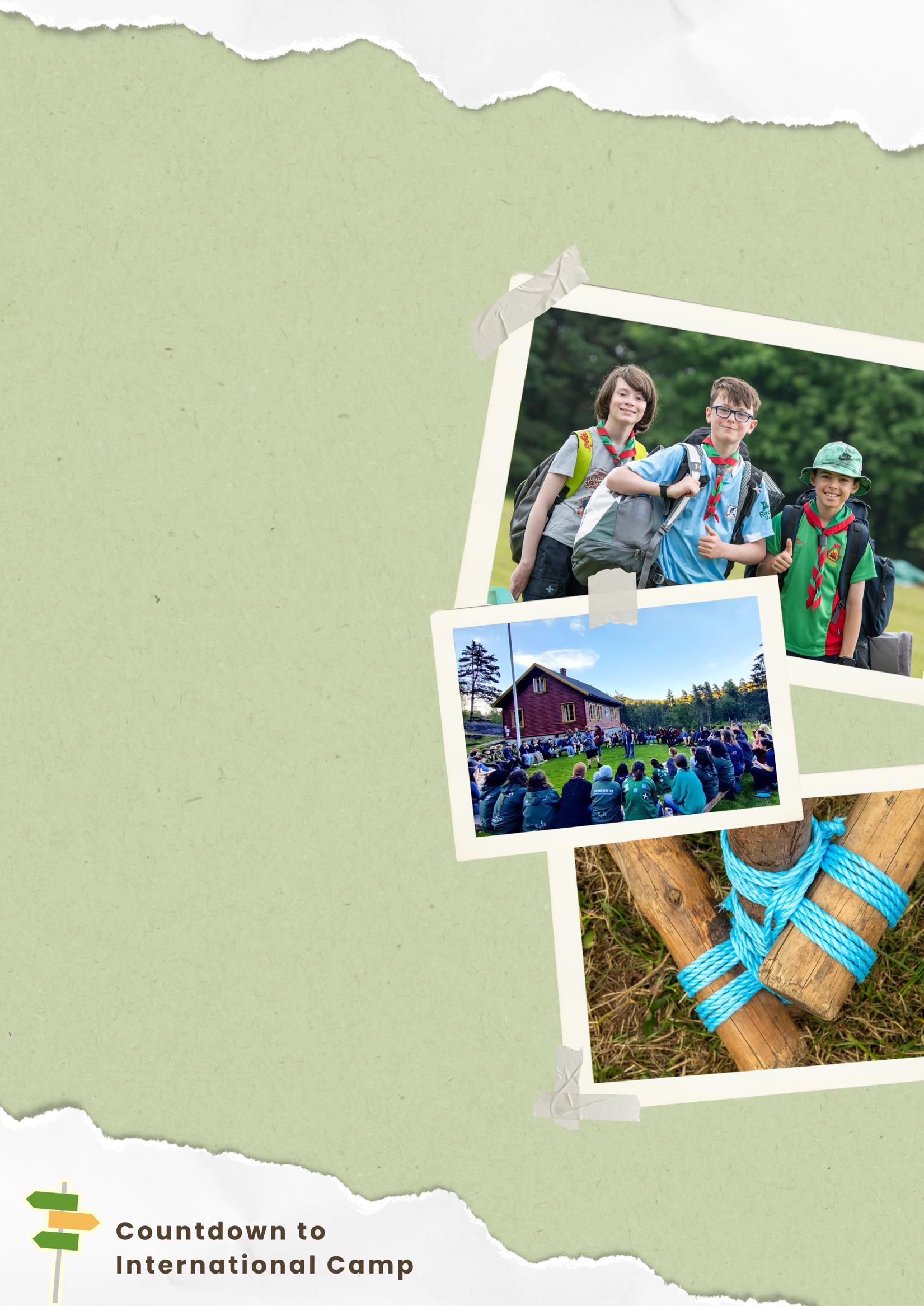
In this month, the second instalment of the camp fee should be taken from all Scouts and Leaders. This could be 40% to 50% of the overall camp fee, or should at least cover all nonrefundable expenses.
If not already confirmed, it is important to arrange for someone at home to become the ‘Home Contact’ for the duration of the camp. This cannot be someone who is attending the camp. It should be a Scouter who will be in Ireland and contactable for the duration of the camp and who has access to the database for your group at GL level. The role of the ‘Home Contact’ is to be the ‘go to’ person for parents at home and Scouters on camp, facilitating contact between those at home and abroad as required. The ‘Home Contact’ should have a hard copy of all consent forms in case they are needed. In case of emergency during the camp, the ‘Home Contact’ may also need to liaise with staff in Scouting Ireland. If there isn't
someone available then it should be the County Commissioner.
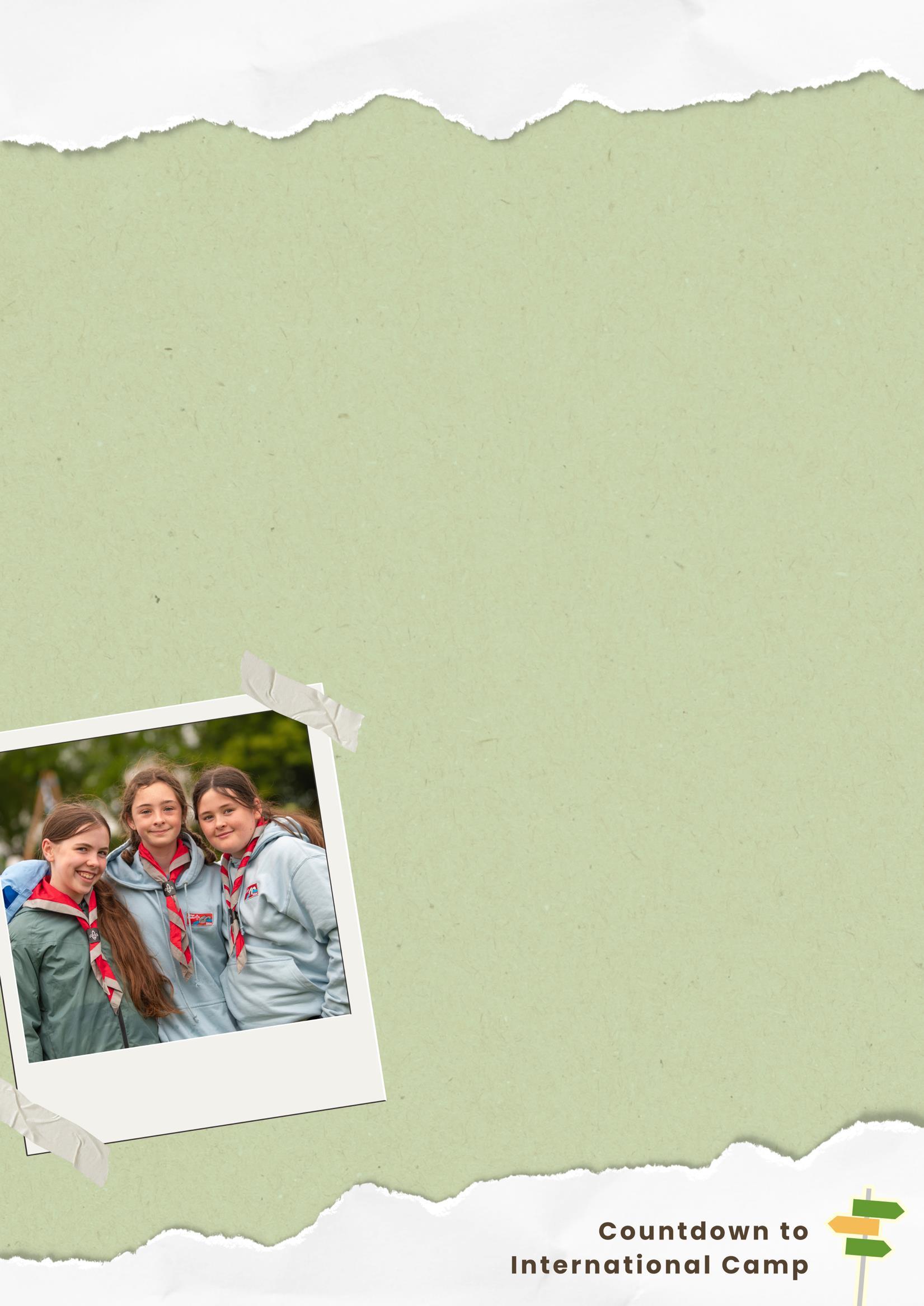
A requirement for all groups planning a camp outside the island of Ireland is to obtain permission to camp. This includes those planning to attend an international event (e.g. national jamboree in another country or a district jamboree in the UK). This application can only be submitted online and is managed through my.scouts.ie. This application can be submitted by Group Leader, Deputy Group Leader, Group Secretary or Section Leader.
A guide to help with the application process can be accessed here: https://issuu.com/scoutingireland/docs/applying_for_international_camps _on_the_mms
Answers to Frequently Asked Questions that might further support the application can be found here: https://issuu.com/scoutingireland/docs/international_camp_application_f aq
Scout Groups applying for permission for international camp often encounter challenges which delay their application being approved. These challenges include all Scouters attending camp not having up-to-date Vetting/ NI Access and safeguarding training or Youth Members turning 18 during camp.
These challenges can usually be resolved but sometimes take time. Therefore, it is encouraged to begin the application in March to ensure that groups have sufficient time to address any challenges and still obtain the permission to camp well in advance of camp.
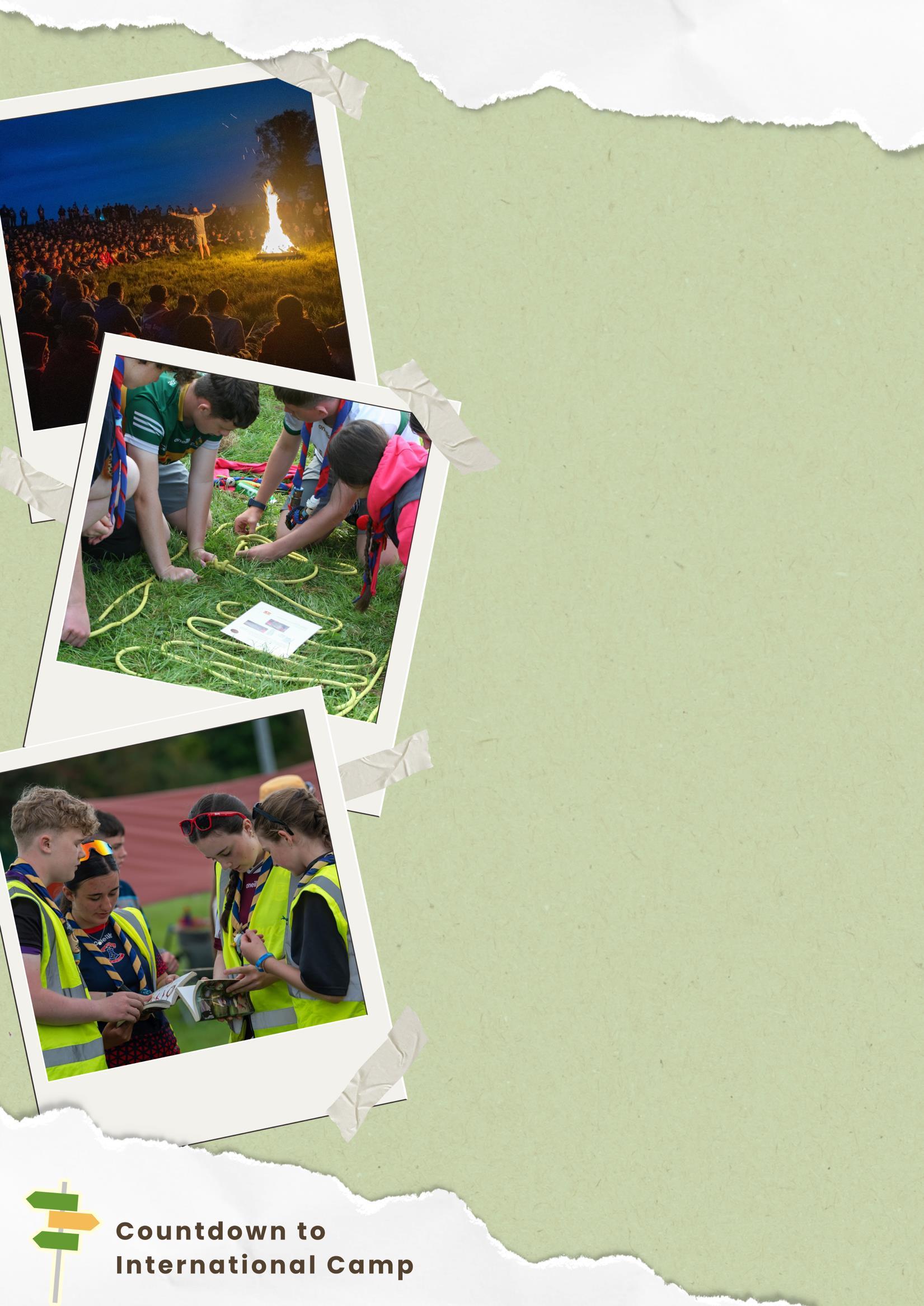
At this time the youth members attending camp should have a discussion about ‘Plan B’ or alternative activities and games that can be used if the weather turns bad and all the Scouts/Ventures are stuck in a marquee or a big hall for a few hours.
Plan B activities may include:
• Cinema
• Swimming Pool
• Bowling
• Museum
Marquee Games:
• Patrol/Watch Challenges (Kim’s games, strong Scout, iron stomach, etc). One Scout from each patrol/watch does one game each and all patrols can bet on who they think will win to gain extra points.
• Charades / Pictionary
• Board Games
• Cards
• Sing Song / Campfire
• Puzzles
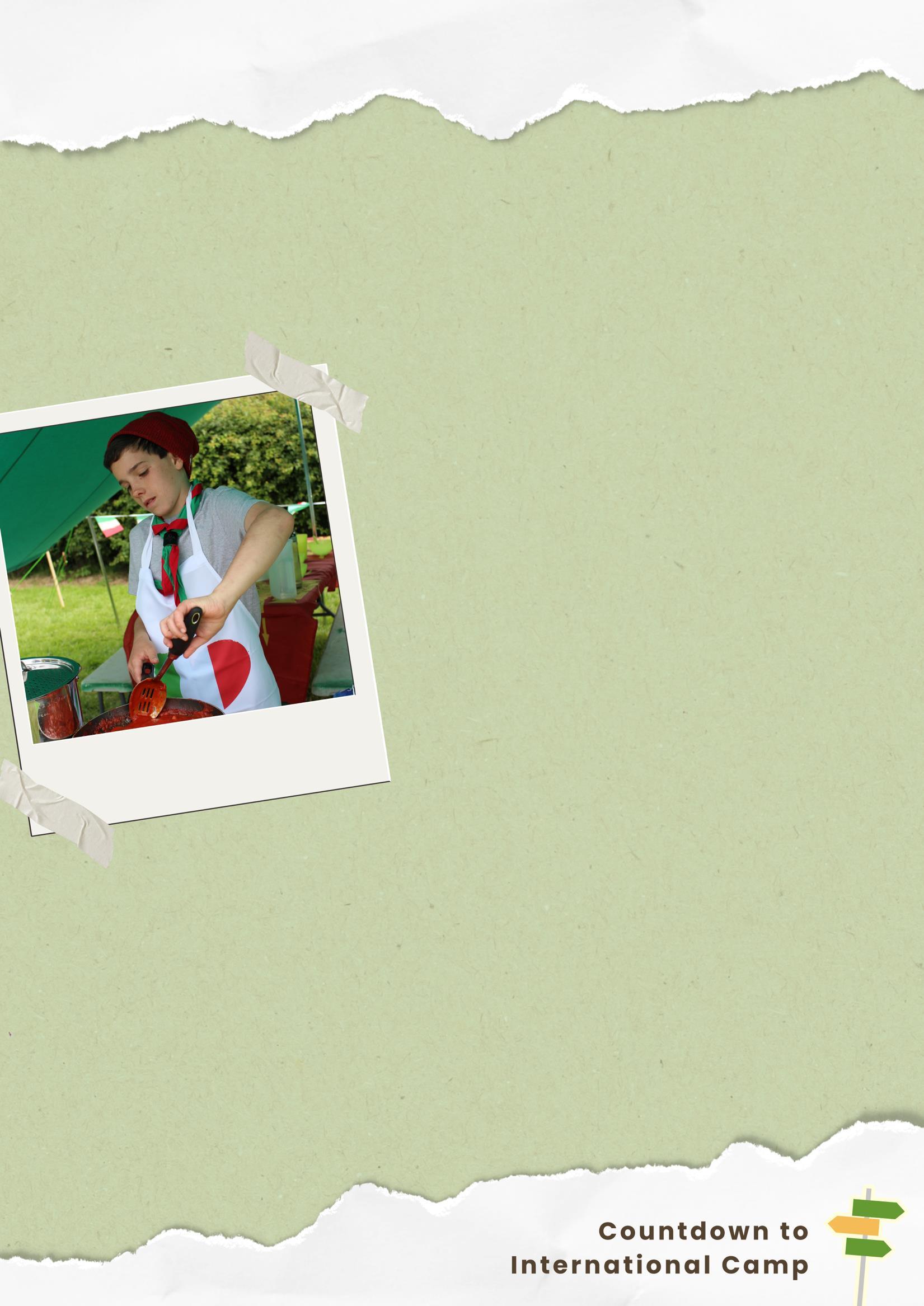
A detailed camp programme should be drawn up as accurately as possible outlining the camp’s programme hour for hour.
Another important task is to set a menu for the camp. The Planning Team/ Quartermaster/Bosun should get input from the rest of the Youth Members so that the team has a good idea of what they want to eat but also keeping in mind the different food groups and healthy diets and available cooking methods. Certain foods may not be readily available in certain areas.
The Scouters should be aware of individual dietary requirements from the Activities Consent Form, but it may be helpful to double check with the relevant Youth Members again.
Remember that those attending camp may eat more than normal as they are in the outdoors and active all the time. Also consider what food storage options will be available during camp, particularly for keeping food cold. It may be that there is a day where the menu should rely on more nonperishable foods, depending on how easily accessible the local shops are and what days they are open. For example, in some countries/regions shops do not open on Sundays or on religious holidays.
The Quartermaster/Bosun of the camp should make out a list of all the gear that the section needs for the camp and also check that the equipment is in working order. The below sample list should be changed to suit the Group and number of people that are going on camp:
• Sleeping Tents
• Store Tents
• Marquee / Leaders Mess Tent
• Leaders Sleeping Tents
• Pioneering Wood
• Sisal
• Lashing Cords
• Saws / Hatchets / Spade / Sledge
• Mallets
• Pegs for all tents / Marquees
• Ground Mats for tents
• Patrol Boxes
• Gas Tanks
• Gas Cookers
• Matches / Lighters
• Fire Barrels
• Fire Grates
• Buckets
• Tea Towels
• Scrubbing Pads
• Flags and poles

• Tent Brushes
• Cooking Pots (Big, Medium and Small) + Lids
• Frying Pans
• Cool Box
• Chopping Knives
• Ladles
• Spatula
• Basins
• Water Carriers
• Dining Shelters
• Table and Chairs for Marquee
• Toilet Roll
• Spud Masher
• Whisk
• Tin Opener
• Compasses
• Balls for games
• Ropes
• Pulleys
• Bin Bags
• Lanterns
Make every effort when going abroad to link with another Group where you are going and try to borrow equipment to save on costs. Check also with the campsite as some can provide equipment (either free of charge or to rent) and useful contacts.
A few Scouters and Scouts should get together and go through the first aid boxes and make sure that there is enough in the boxes for the amount of people going on camp and for the length of time. The table below shows the amount of equipment that should be in a Travel Kit or box for the amount of people on camp.

Individually Wrapped Sterile Unmedicated Wound Dressings
Source: http://www.ofaaa.com/resources/firstaidguidelines.pdf

Per Scouting
Ireland’s Uniform Policy (SID UN01), Scouting Ireland’s International Neckerchief “can be worn by Scout Groups / Programme Sections who have been approved to undertake a Youth Programme Abroad activity… whilst on that activity outside the island of Ireland”. Once your Permission to Camp application has been approved, the Camp Leader named on the application form will receive an International Neckerchief Approval form. This letter can be used at the Scout Shop to purchase the neckerchiefs for those attending the camp. Groups can also buy
the Irish Swap Neckerchiefs, so that they have additional neckerchiefs for swapping while abroad. To avoid disappointment and avoidable stress, please submit your request to the Scout Shop as far in advance of your camp as possible.
Travelling with Medication: Most medications can be brought on airplanes in checked luggage. In the event that essential medications of greater than 100mls needs to be brought on the airplane, check with your airline in advance to ensure you can arrange the relevant documentation (e.g. a doctor’s letter).
Storage of Medication: All medication should be stored correctly and safely to ensure only those prescribed it have access to it. Some medication may require it to be kept refrigerated, so please ensure that there are facilities on site for this to happen.
Document Storage: You need to consider the safe & locked storage of documents such as:
• Travel tickets
• Passports
• Money
• Visas
• Entry or registration documents for the event / site
• EHICs
• Insurance Documents
Is there a location on site to hold these documents? Have you a lockable bag or case you can easily transport to bring with you?
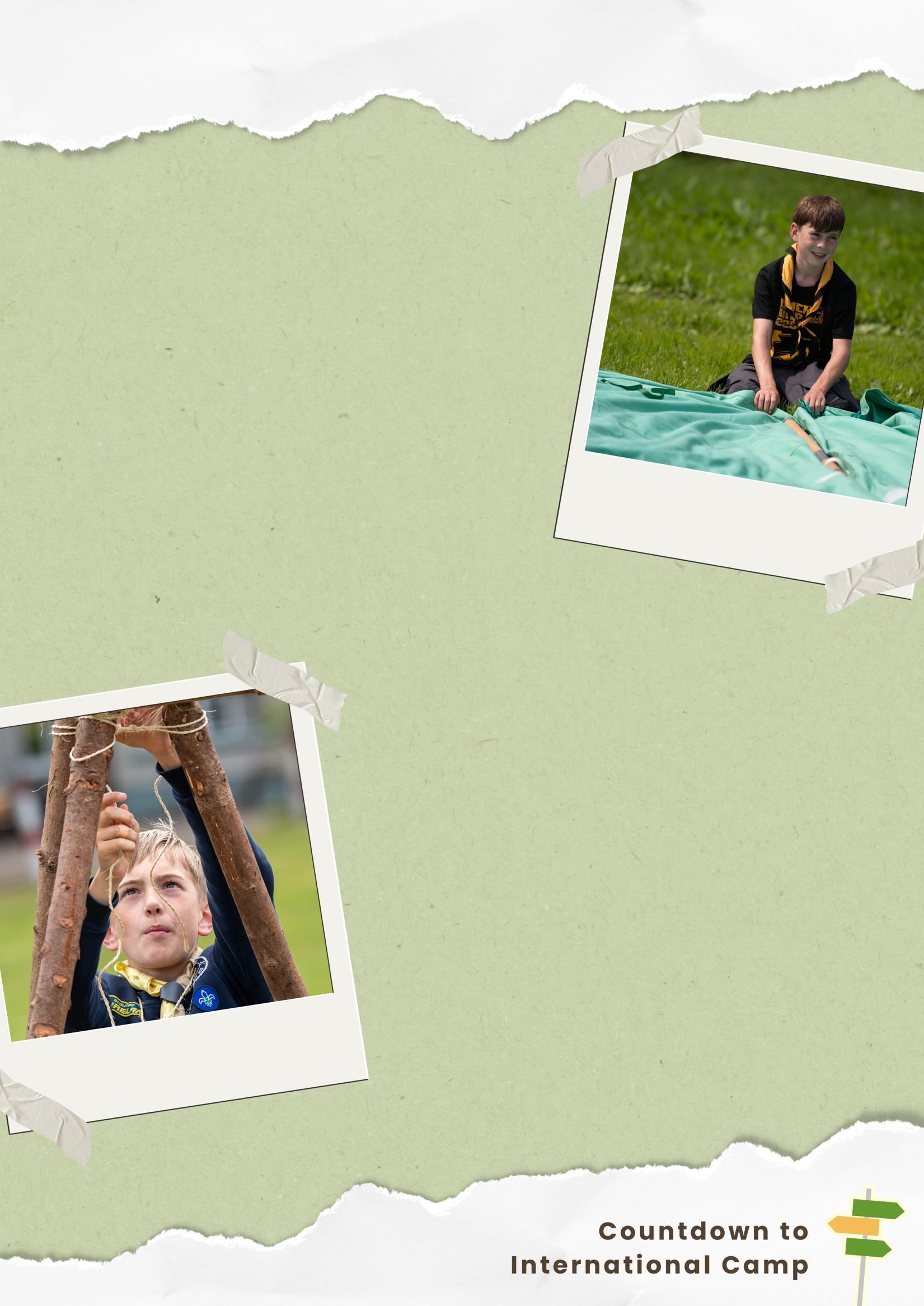
Uniform Standards: Many groups hold the tradition that full Scout uniform should be worn when travelling. This is not written in any policy and is left to Scout groups’ discretion. However, it is advised that those attending Scout Camp should be dressed uniformly when travelling, as it makes it easier to recognise your group in a crowd. For example, some groups will create eventspecific polo shirts, with their Scout group logo or summer camp name on the polo and pair these with the uniform navy trousers for travelling.
Neckerchiefs should be worn at all times during travel and camp, unless the safety restrictions of specific activities prohibit it.
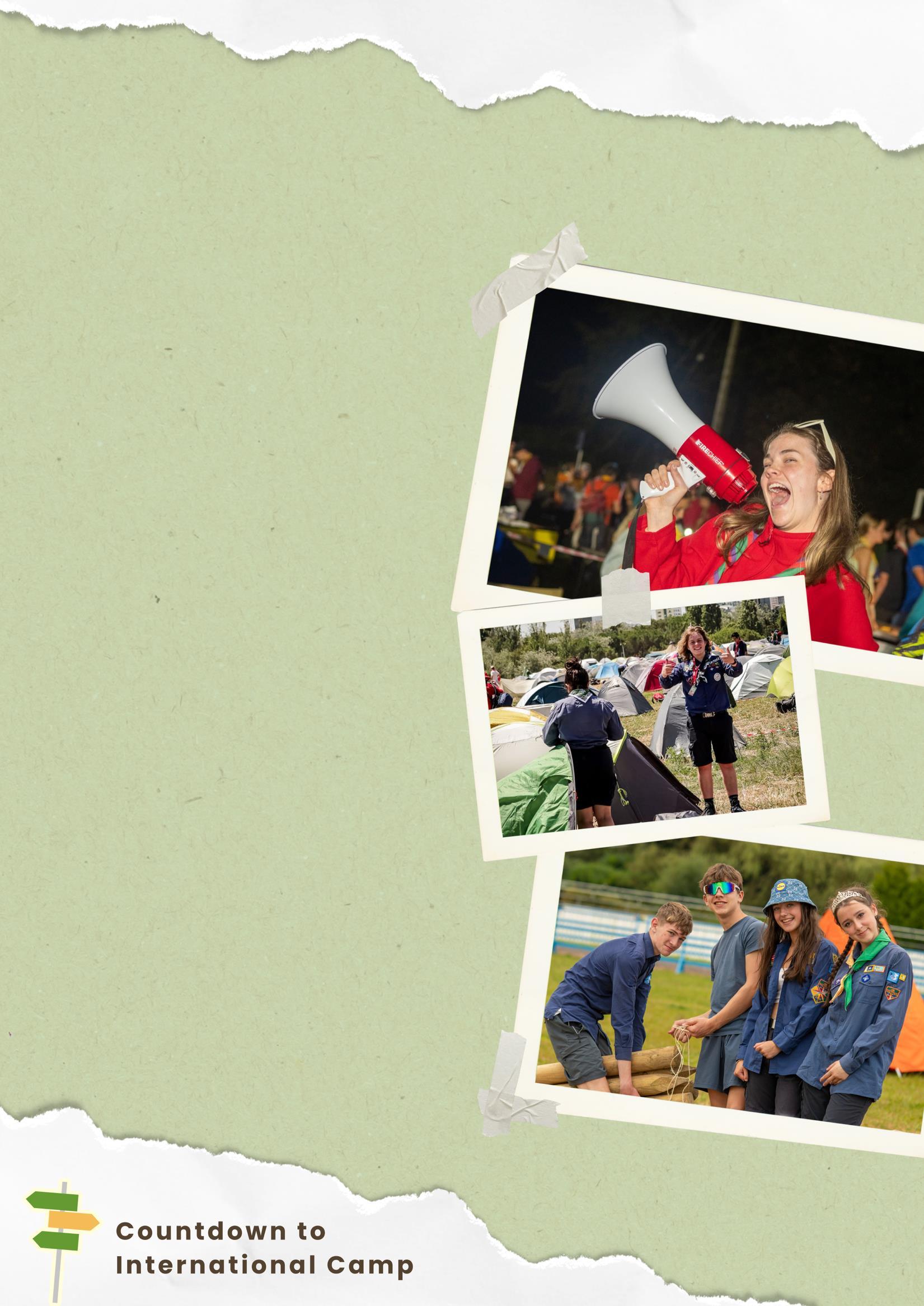
Communications: It is essential that at least two Scouters have access to mobile communications while on camp. When travelling outside of the EU, it can be helpful to source a local SIM card.
When budgeting for camp, a provisional sum for the provision of the SIM cards should be considered.
The number of SIM cards required will depend on the type of camp and who should have them, for example, is it one per Troop or one per patrol/watch.
If Scouts bring their own mobile phones, it is advisable to make them aware of roaming charges, and the possibility of running up large bills.
Another consideration when planning mobile phone use is to ensure that you have a phone charger and adapter and/or a battery pack ready to go.
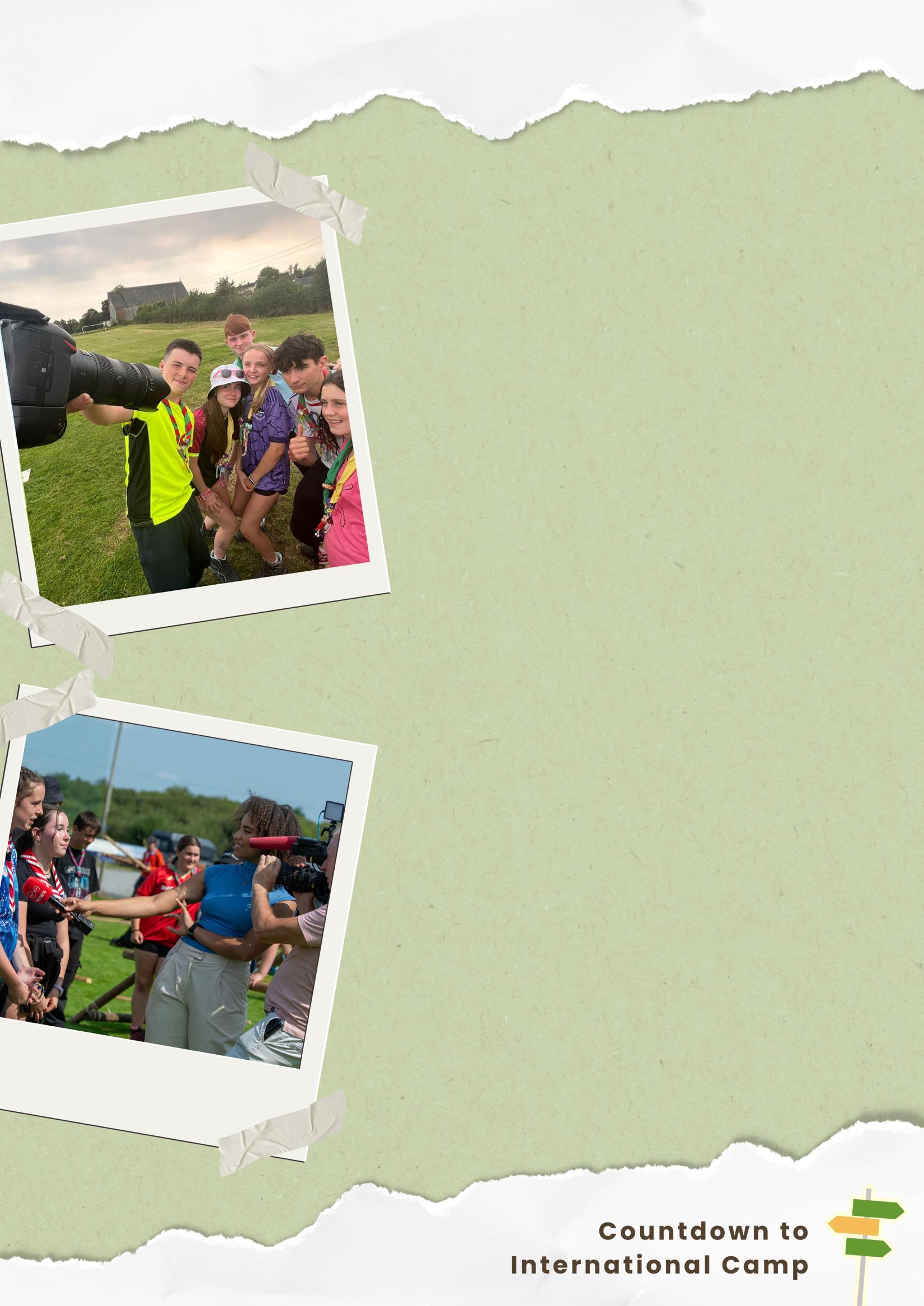
It is advisable to take some time before going on camp to discuss the plans for documenting the camp and sharing key moments on social media. This may involve designating a Scouter as the media coordinator or tasking each Patrol with creating their own photo log of the camp. A clear process should be created to ensure appropriate content is selected and posted regularly on social media during the camp. ‘Social media’ may be public platforms like Facebook, Instagram, X or TikTok, or may just refer to the parents’ WhatsApp group.
If a group chooses to post updates on social media, is it important that those updates are regular. For example, if parents/guardians who are following the camp online from home get regular updates for four days and then nothing for the next three days, that may cause them to worry that something has happened. Sometimes groups choose to designate their ‘Home Contact’ as the person responsible for posting on social media, as they can deal with any questions or queries that come in from parents/guardians via social media channels while on camp.

It may be helpful to draw up a camp Rota for the camp so that each Scouter knows what he/she must do that day and so that all the jobs aren’t left to one person. The following is an example of a Rota. Each duty could be done by 2/3 people, depending on the number of Scouters and youth members on the camp. These should be printed and laminated and displayed clearly whilst on camp.
Description of duties on a Scout camp, these duties could be split between everyone
• On Call: This person would wake all youth members and Scouters and make sure they are up and ready for flag-break.
• Cooking: While the Patrols are cooking other Scouters might oversee and make sure that the food is being cooked properly.
• Clean-Up: Decide on the method and rota of clean up depending on whether you are section or patrol cooking...
• Quarter Master/Bosun: This person’s duties include arranging the shopping, checking the Patrol Boxes and distributing supplies to Patrols, etc.
• Inspection: These people would inspect the Patrols on their sleeping tents, site, etc.
• Programme: This person would make sure that all programme items are in place and set up. They would work in conjunction with the Programme Coordinator from the Camp Team. They would also need to communicate to the PLs/WLs what the Patrols/Watches will need for the activity, etc.
• Social Media: This person would make sure that appropriate photographs/videos are taken, selected, and posted on social media regularly during camp.
• Other duties may be added to the list as the camp may need.
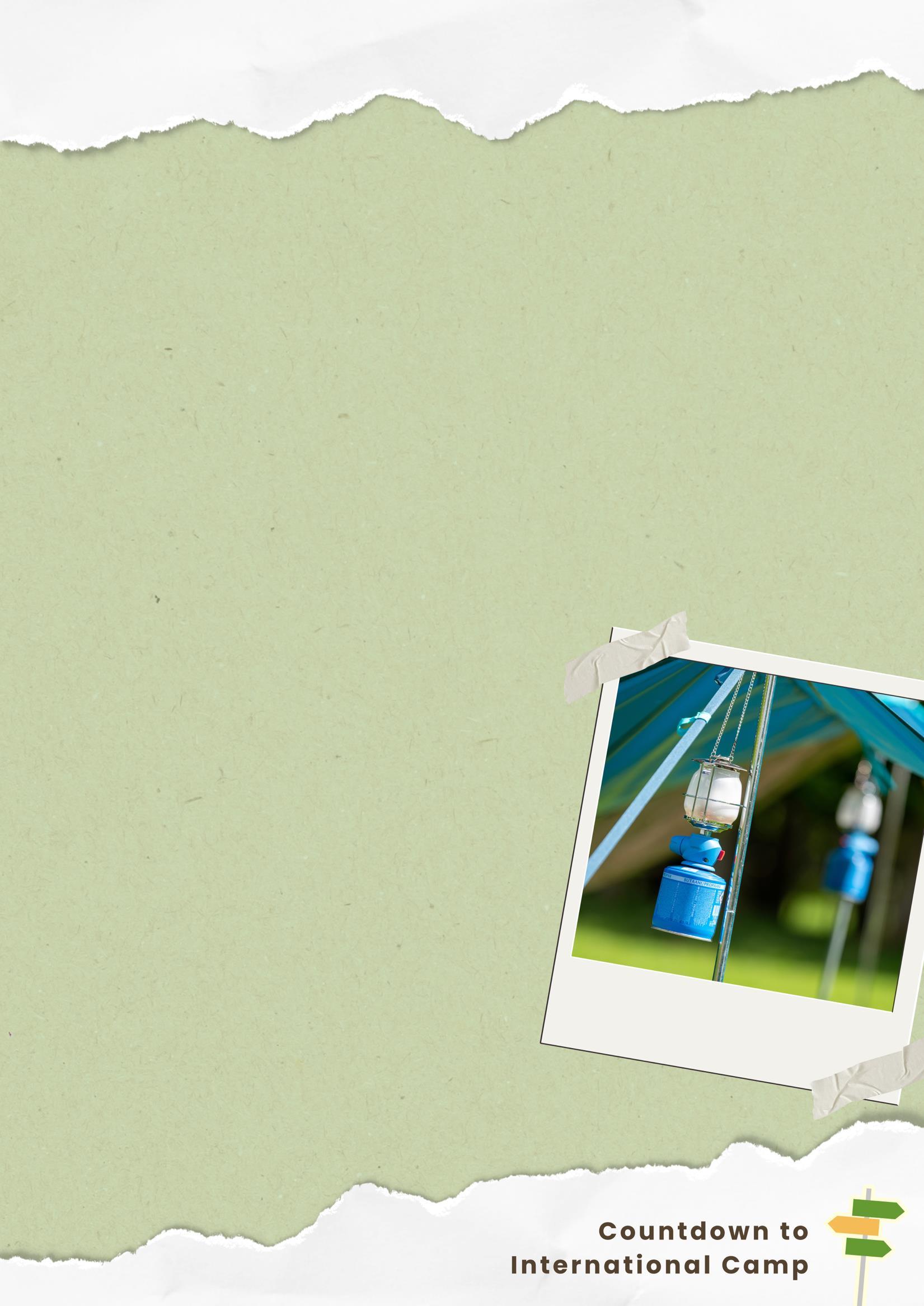
It may be a good idea to have a ‘camp bank’ so that the Scouts’ money is safe from being stolen and also that their money is regulated over the camp. It is quite common now for Scouts to bring a pre-loaded Revolut card on camp with them (https://www.revolut.com/revolut-kids-andteens-parent-and-guardians/).
An amount of spending money should be recommended to parents/guardians, this could be decided in consultation with the parents/guardians at a meeting during the planning process. In the event that Scouts bring cash on camp, this could be managed by the Camp Treasurer in the form of a Camp Bank.
Please be mindful, if travelling outside of the Eurozone, to have the correct currency for camp. This may involve buying currency through the Revolut app or ordering currency through your local bank.
Never underestimate the power of a ‘Thank You’ card. It is often useful to bring a few ‘Thank You’ cards and spare group badges / neckerchiefs with you on camp, so that you have them to give as thanks to those that help during the camp. It may be a planned ‘thank you’ to the local Scout group who host you, or the staff at your campsite who helped with activities, or it may be an unexpected ‘thank you’ to someone who stepped in and helped during a crisis or unexpected challenge.
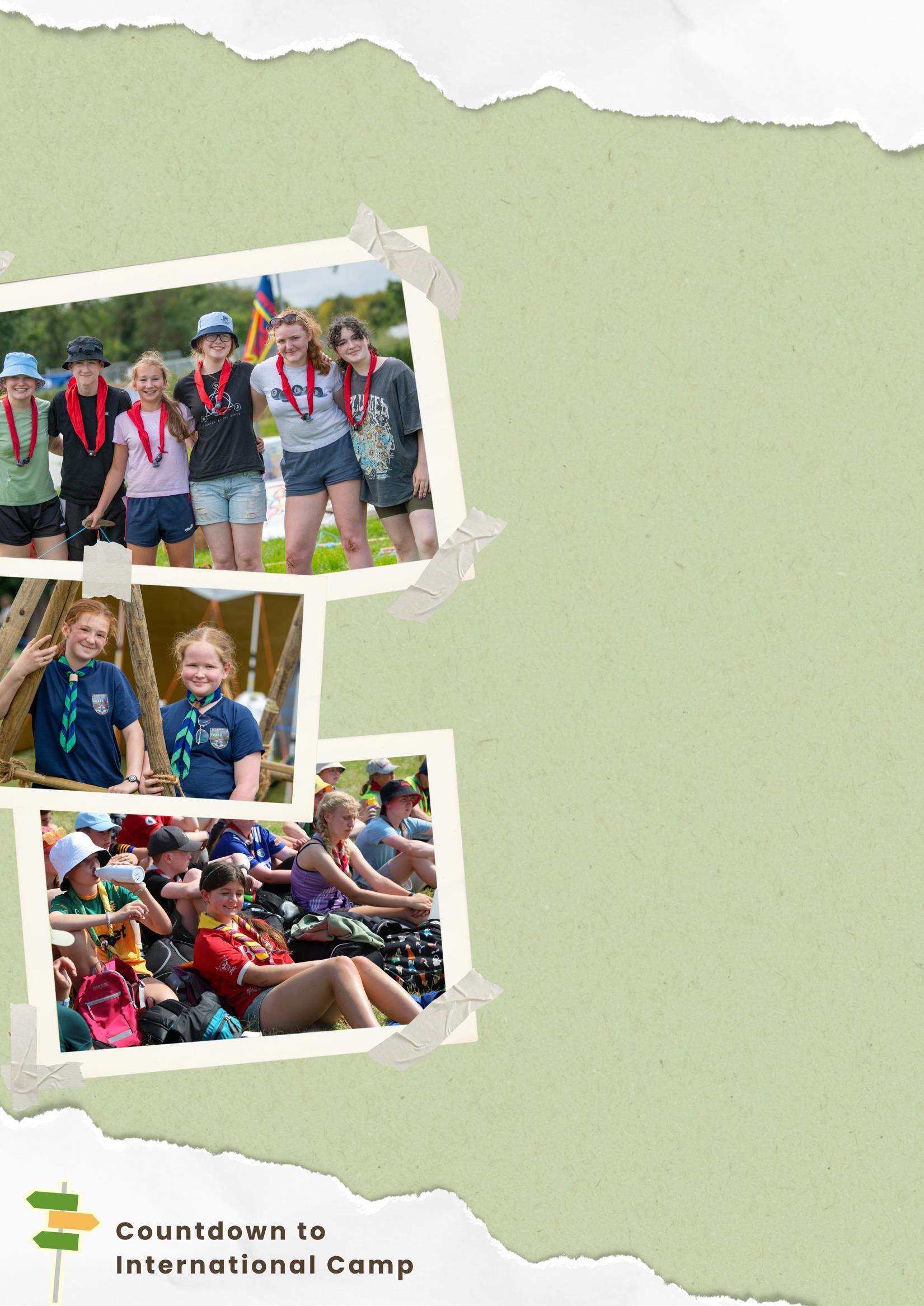
At the end of the camp, maybe at the final campfire, a review of the camp should be undertaken with everyone. Their opinions on the different aspects of the camp should be taken, e.g. food, programme, Scouters, location, campsite, facilities, value for money, etc.
This review can be done in several different ways:
• Get them to stand at different sides of the campfire to signify their opinion e.g. great, ok, could be better.
• Split into groups and get each group to discuss a particular aspect and then feedback into the whole group.
• Have a written feedback form that everyone can fill out.
• Other ways may include: Using clapping or cheering to signify their opinion, standing up if you agree, etc.
Be sure to properly document the review. The best time to start planning next year’s camp is while you are still on this one!
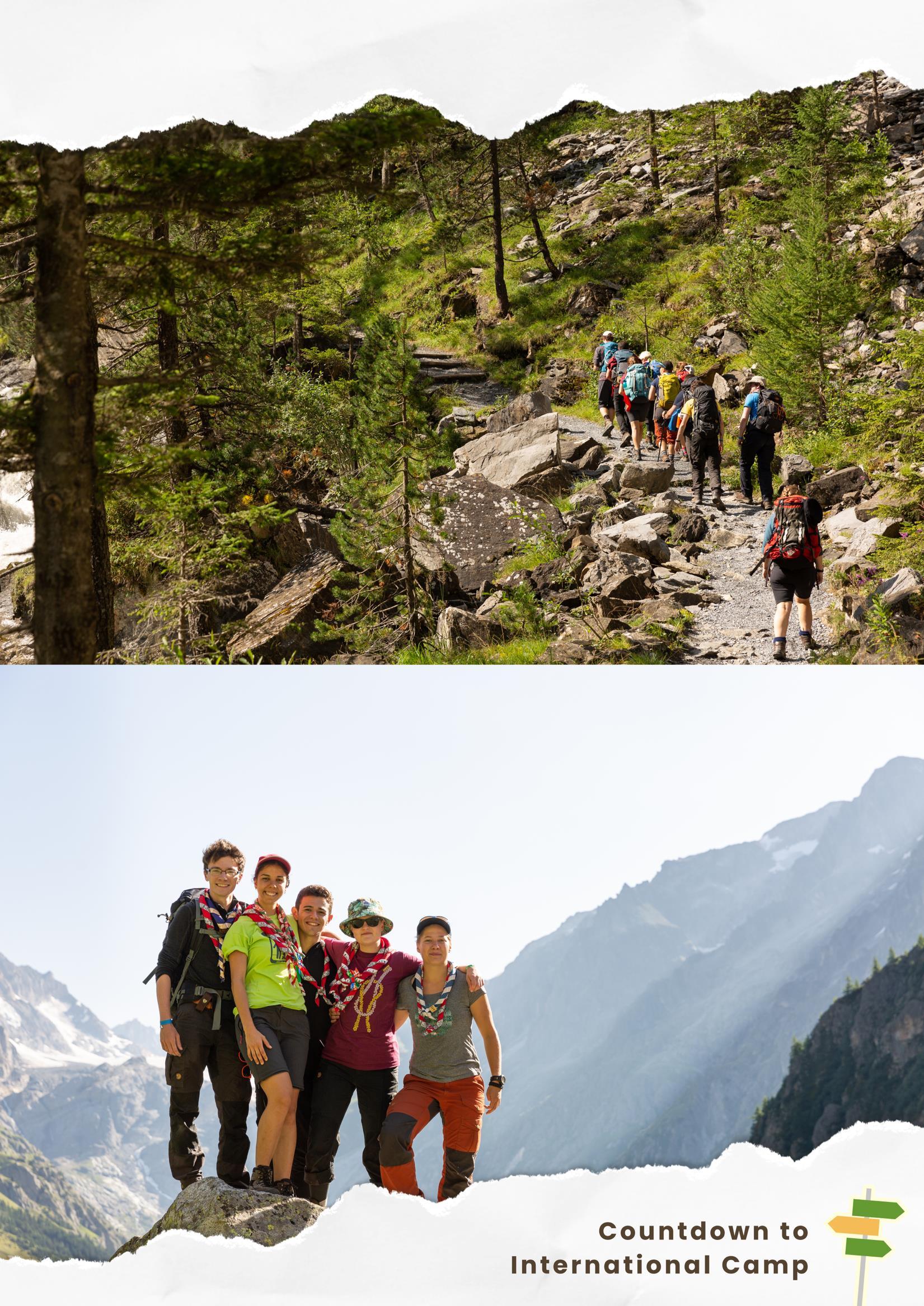

Check what documents and visas are required for visiting a country: https://www.ireland.ie/en/dfa/overseas-travel/advice/
Apply for a passport:
https://passportonline.dfa.ie/Apply/Passport
Check the latest guidance on required and recommended vaccinations before travelling:
https://travelhealthpro.org.uk/countries
Parental/Guardian Permission Letter for Child Traveling Abroad
https://issuu.com/scoutingireland/docs/parental_guardian_permission_le tter_for_children_t
European Health Insurance Card (EHIC)
• Apply: https://www2.hse.ie/services/schemes-allowances/ehic/apply/
• Renew: https://www2.hse.ie/services/schemesallowances/ehic/renew/
• How to Use: https://www2.hse.ie/services/schemesallowances/ehic/visitors-to-ireland/
Scouting Ireland Permission to Camp application process:
• Guide: https://issuu.com/scoutingireland/docs/applying_for_international_ca mps_on_the_mms
• Answers to Frequently Asked Questions: https://issuu.com/scoutingireland/docs/international_camp_applicati on_faq
Information on using Revolut cards
https://www.revolut.com/revolut-kids-and-teens-parent-and-guardians/
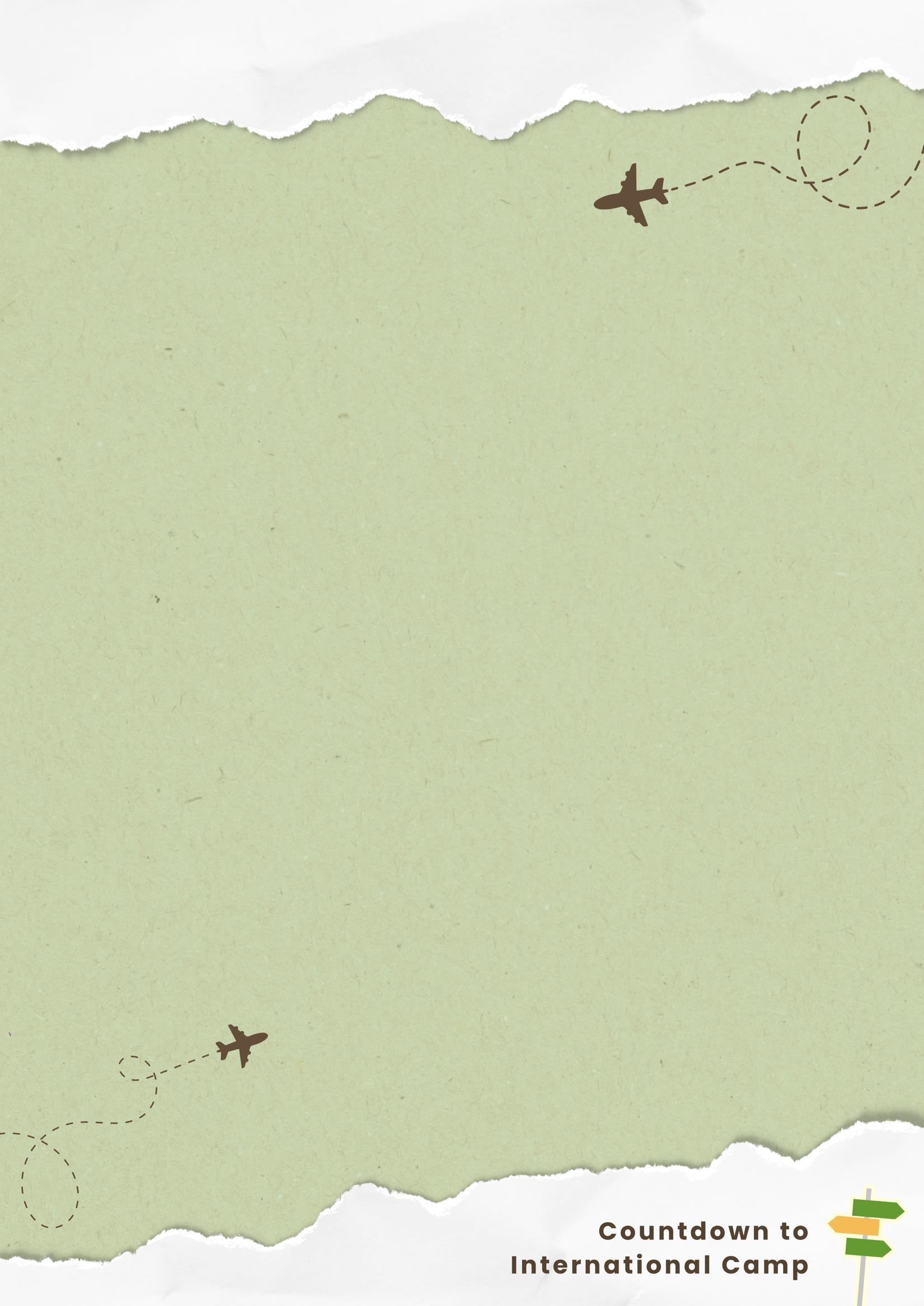
For advice on security, passports, female travellers, members of the LGBTQIA+, visas, etc.:
Know Before You Go | Ireland.ie
Not every country has an Irish embassy or consulate within its borders, so for information on the embassy relevant to your country of travel please consult the following link:
Irish Embassies and Consulates Abroad | Department of Foreign Affairs | Ireland.ie
For Assistance while travelling abroad:
Assistance Abroad | Travel | Department Of Foreign Affairs | Ireland.ie | Ireland.ie
The Department for Foreign Affairs and Trade recommend that any Irish Citizens travelling abroad register their details at the link below. This information enables the Department to contact you and provide assistance when and if necessary. This is only available outside the Common Travel Area (Ireland/Great Britain, the Isle of Man, the Channel Islands and Guernsey).
Citizens Registration | Department Of Foreign Affairs | Ireland.ie | Ireland.ie
If you are travelling with a member who is not an Irish citizen, the link below may be of help to you. It is designed for Schools travelling abroad. If you need to use this form, please contact the International Team for a letter of support.
Travelling as part of a School Tour – Immigration Service Delivery
